#so the formality in these novels is v interesting to me
Text
i have a linguistics question, especially for people who can read chinese: what register does mobei-jun speak in? with sqq and lbh there's a lot of formality, like the polite "this one" and "this disciple" or the even more formal "this master" and "this lord," but I'm skimming the airplane extras to figure out how mobei-jun speaks, and it doesn't look like he does the same thing? he seems to use first and second person pronouns informally? is this accurate or a translation thing? is it just because he's talking to sqh?
#svsss#my linguist brain has a lot of fun analyzing the ways people refer to themselves and others#especially in other languages/translations#so the formality in these novels is v interesting to me#and im curious if/why mbj doesn't do the same thing!
17 notes
·
View notes
Text
Archive of the Odd Issue #1 Review of Individual Stories
The beginning of these issues. As it's the first, it's... not the best. Still, I would say it's a good start. Titles and Author and Artist names will be included along with the reviews.
The Securities & Exchange Commission v. The Undying Sea (Auth: Simo Srinivas, Illust: DS Oswald)
Bit of a weak start to this Issue. From what I remember, this story centers around the ocean and the bureaucracy. Not much to write home about.
2. The Comments Section (Auth: Andy Tytler)
Seems to be a commentary on what happened when COVID was at its prime. This one was just annoying, but unfortunately it wasn't really the 'trolls' that caused it. Rather it was that one user that had polka in their name that makes me glad I'm not in communities where people actually talk like that.
3. Incident Report (Auth/Illust: Cormack Baldwin)
By the editor of this very zine, the descriptions are very beautiful... except these descriptions are within usually formal incident reports and autopsy records. Also, found it weird in the beginning that "Here is what is known" is repeated twice at the beginning of the paragraph. At least the notes detailing the incident kinda fit?
4. Click Me (Auth: Rachel Rodman, Illust: Hira Rashid)
Pretty meh on the 'unusual format' all stories strive for, but still isn't bad. In fact, I kinda like the idea of clicking being what gives us humanity, except that's not quite true: curiosity makes us human, and curiosity makes us click links which. :TRUE:
5. A Series of Notes Found Scribbled Inside the Romance Novels in The 50p Section Of My Local Oxfam (Auth: Georgia Cook, Illust: Alina Wahab)
Damn, for a title so long, the actual story is pretty short. This story's pretty much star-crossed lovers between a male love interest and some real-life person. Wish the build-up between the rest and the last page was more.
6. The House of Fitted Stones (Auth: Daniel Simonson, Illust: Rieroo/ Morgan Versluys
Nice job on the forum, gotta say! The non-ending is a bit disappointing, but I'm allways a sucker for stories involving houses.
7. Goblin Universe (Auth: Barrie Darke, Illust: Hekatos Mist)
Not really goblin-y. Had to adjust to the use of usual English names halfway through.
8. HALLWAY (Auth: RL Meza)
Pretty generic on the unusual format. Still, something about the reflections vibes with me recently.
9. Skipping (Auth: Simon J. Plant, Illust: Beatrice Olive)
Feel like this story could do without the ending twist. Alone this story actually kinda rules. Time flies so fast...
10. KULLEN Product Support (Auth: EV Smith, Illust: Renée Elizabeth Clarke)
I love these kind of stories, where it all slowly goes all wrong. And what better place than an IKEA?
11. Queen of the Underground (Auth: Mareen O'Leary, Illust: George Cook)
Don't feel much about this one. Sorry.
12. Video Nasty (Auth: Jack Fennell, Illust: Toeken)
This one is not only my favorite of the whole issue, but maybe one of the best in the whole series. The whole thing is about miscommunications on gesture between humans and an alien species, first with movies. Great use of aliens not really understanding how humans express themselves and vice versa.
13. Welcome (Alexis Ames & Kat Veldt)
Nice little piece to end this Issue. Amusing how Earth seems to be in the end-times, complete with some eldritch entity visiting. Made me cackle a few times.
0 notes
Note
What are your favorite chinese webnovels? What are some of the differences youve noticed between cnovels and other types of novels?
That second question is really, REALLY interesting, and I really want to answer it well, and I am REALLY sure I’m going to do a bad job of answering it, so let me just noodle about that first question for a minute while I try to think XD
I went through some of my TOP-top favorite novels in more detail yesterday, but generally speaking, mxtx and meatbun are both at the top of the pack. They’re really good at writing compelling main characters and balancing piles of angst with plenty of humor and pulling everything together into a very satisfying ending (which is something I don’t alwaysssss see, even in some of the novels I really like). After them, The Disabled Tyrant’s Pet Palm Fish (transmigration, ancient chinese prince falls in love with pet fish) and Golden Stage (ancient chinese gay arranged marriage between bitter enemies(?)) are two novels that I love a lot, which both have very cute romances and go a bit lighter on the main character suffering front, and which I broadly recommend to anyone who’s interested in the genre. They didn’t end stick the landing QUITE as hard as an svsss or tgcf, but they still were very nice.
Then, let me see. I’m trying to remember which books I’ve read in the last year, and am doing a terrible job, haha. I will say that a book I enjoyed for like... eighty percent of it and then the ending let me down terribly was The Dreamer In The Spring Boudoir (modern day career woman transmigrates into barely-fantasy ancient china novel as the disliked primary wife of a nobleman), which is also the only straight webnovel I’ve read so far. The main character and romance were delightful, but that ending... haha, wow, I felt betrayed. But I did like the first half very much!! I’m idly contemplating a deliberately-partial reread. Then I’m currently like two chapters away from catching up with the current translation of The Wife Is First (ancient chinese prince lives out time travel fixit fic, determined to treat his spouse better this time around). I’m also catching up on Heroic Death System (transmigration, across MANY universes, where the goal is to die heroically in each one, and also maybeeeee to find his boyfriend in each one. this shit gets fucking bananas. in one of them, he emotionally seduces his boyfriend while he’s a dolphin. in another one, he’s a sentient mushroom. i’m in the middle of a section titled ‘I Am An Evil Pen’. yes, like a writing utensil type of pen. this is the weirdest book I’ve read so far). Oh, and Thousand Autumns (righteous sect leader gets sabotaged and loses a fight, wakes up blind and amnesiac, demonic sect leader is like ‘lol i bet i can turn him evil’ and accidentally catches feelings along the way).
What else... I’m keeping up with (but behind on) some others. First, there’s How To Survive As A Villain (modern terminally ill CEO transmigrates into stallion novel, wakes up as villain, accidentally seduces hero). Then, we’ve got Transmigrating Into The Body Of The Heartthrob’s Cannon Fodder Childhood Friend (only modern webnovel I’ve read, young man transmigrates into beginning of gratuitous whump book, back in high school, and is determined to protect the protagonist from all the canonical suffering). Then there’s Pulling Together A Villain Reformation Strategy (guy transmigrates into story as the hero’s childhood friend who will eventually become his enemy and get killed, successfully acts out his part and dies, completely fails to realize he’s broken his friend’s heart in the process... and then wakes up in another character’s body). And then there’s The Villain’s White Lotus Halo (a transmigrator keeps bouncing from universe to universe as a cannon fodder villain, who gets like half a line before being killed. he tries to purchase an upgrade package so he can be a COOL villain instead, but accidentally gets sold a ‘white lotus halo’ package instead, so that no matter what he does, everyone is just DEEPLY moved by his appearance and is positive he did nothing wrong). All of those are EXTREMELY delightful. You may notice a running transmigration theme, which....... yeah, I think there are a TON of delightful stories in the webnovel scene that deal with this genre, which seem so rare in English language media.
Which makes a good transition point to what’s different about the cnovel scene! I’ve seen hardly any transmigration stories in English, and I’ve got a couple go-to examples for when I’m trying to explain it, but like. Only a couple. Which is such a shame! Like, there’s the default idea of ‘I was reading this book and then I woke up inside the book!!’ but it’s clearly such an established genre that people are playing with it in all kinds of interesting ways, like in The Villain’s White Lotus Halo or Heroic Death System setups. It’s kind of wild to me, because it seems like such a gimme for a nice easy story structure? Whatever kind of world you want to present, there’s no need to introduce it to the reader from the ground up, or find a good way to hook them in. Either the main character read the book in question and can explain the premise and why we should care in pov, or the main character is new to the universe too, and trying to find their own footing. I enjoy it a lot! I’ve sampled transmigration books that didn’t grab me, but I’ve sampled way more that did.
And then, the one semi-technical answer I thought of to this question was the way that these novels tend to handle pov. It’s not a hard-and-fast rule that regular novels are restricted to one pov, or that pov can only change at hard breaks in the story, but if I saw a bog-standard american novel glide from pov to pov the way these novels regularly do, I would tend to wonder if it was sloppiness or a mistake, or I would grump to myself about how I don’t like omniscient third person pov. And I still don’t know exactly what I think about this, or why it’s different in here, but I’m pretty sure I like it a lot, especially for stories where the romance tends to play a large part :V
I used to read a lot of Books About Writing, and read plenty of stuff about why you don’t DO this, but.... I like it! In dtppf, Jing-wang can’t talk, and when Li Yu is a fish, he can’t talk, and drifting from one of their perspectives to the other gives me lots of useful information about how they’re both feeling. Could that be conveyed through restricted pov? Maybe! But I’m typesetting the svsss extras right now, and I’m in the bing-ge vs bing-mei section, and we get a few brief flashes of bing-ge’s thoughts, and it’s so NICE. It’s information I would not have otherwise received, because Shen Qingqiu sure wasn’t going to notice it. But early in the story, that pov was withheld from me, which also made sense (or hua cheng’s pov was withheld from me FOREVER, which makes me so sad ;u;). There don’t seem to be any hard and fast rules, which makes me really nervous about writing fic and trying to match the style, but I do like it a lot!
And I’m definitely not able to articulate this in the way that I would like to, or speak with any real authority (I’m not that widely read in the cnovel scene, and i’m not very genre-adventurous in english), but there’s something about the role that the romances play in these stories that’s different from what I’m used to expecting, and it’s VERY tasty to me. I only rarely read romance novels, because I’m not often interested in the romance as a primary plot driver, but the romances in these books play a more substantial role than I’m used to expecting. And I’m into it! It’s a balance closer to what I’d expect from, like, a shippy longform fanfic. Which covers a lot of ground and is NOT a precise measure, but there’s more emotional weight given to the romance than I would expect, but without the romance carrying ALL of the emotional weight, and it strikes a perfect balance for me in a way I’m not used to encountering. Now, some of this could definitely be due to me not finding the right authors, or right subgenres, or whatever. But in the genres I inhabit, it’s a subtle difference, but one I find compelling.
Oh, one last thing. The cultural differences, duh :P I’m only familiar with things like, say, ancient chinese court etiquette through a lens of fan-translated novels like these, and I didn’t grow up steeped in the culture in a way I’m used to the trappings of something like medieval european courts. But there’s a distinct flavor to the social dynamics of these novels, from the formal levels down to the casual, and I know it’s super intricate and detailed and that authors play with differing degrees of historical accuracy vs fictional fun, and I wish I was better equipped to speak to the nature of any of this. But I find it really compelling! I recognize that it’s only new to ME because I didn’t seek out chinese media before now. And, the point that I originally wanted to get to before I got super distracted: the flirting. The flirting and teasing are a very different flavor from what I would expect in most english language media, and I love it, even if I can’t speak to how much of that is purely cultural, and how much of it is like... the conventions of How Fiction Is Written varying by culture, if that makes sense. I adore seeing what flirting and affection and indulgence and attentiveness look like in different settings, and these books, with their heavy romantic focus, absolutely deliver.
#spock replies#long post/#i've read more novels than i thought :p#i thought it wasn't many#but then more kept occurring to me#i've only read a few that i don't recommend period but i've read a lot of good ones#Anonymous
53 notes
·
View notes
Text
Analyzing Hélène's horrible horrible costumes in BBC War and Peace in no order whatsoever
they’re just so bad
Opening scene

Okay. I’m starting off on a good note. I actually like this dress. I think it’s pretty. From a costume design standpoint, she looks elegant, and very much like a grecian statue. Antique beauty was ALL the rage in this period, the fact that she kind of looks like she’s literally wearing a chiton kind of works for her. She is this marble woman, but she’s also very young, and I like that she’s in white (both fashionable and also adds to Pierre’s romanticizing of her). Is this dress historically accurate? No. But I think this is a decent example of historical influence over absolutely strict historical accuracy. Unfortunately it’s all downhill from here.
Vassily Kuragin uses his real life daughter to play The Sims
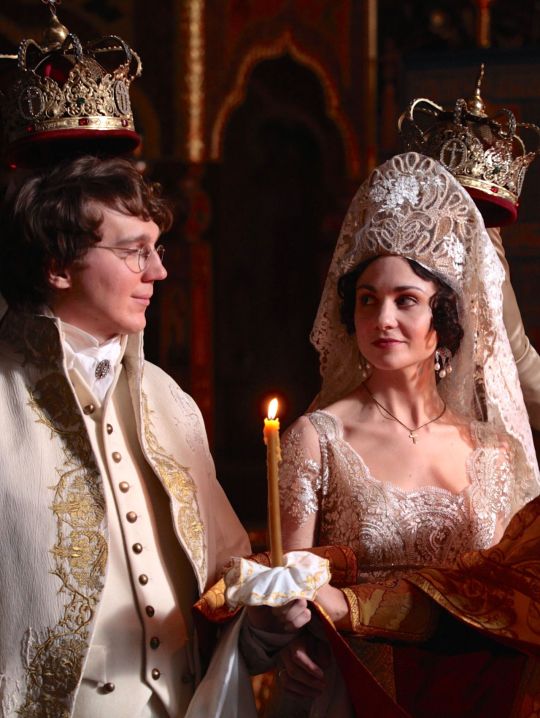
This is giving me serious reign energy, or at best downton abbey. She wears a square neckline for once, but other than that I have nothing to say. That wimpy little cross necklace is weird, she’s not a 13 year old at horse camp.
Scarlet letter headass

I think I know what they’re going for here. Hélène wears this when she meets Dolokhov, she’s about to cheat on her husband, so she’s in this dark red, low cut gown. Draped details. Very evil. I like the color. Could be worse! However the need to modernize her cleavage is getting on my nerves. Compare to this as a possible alternative:
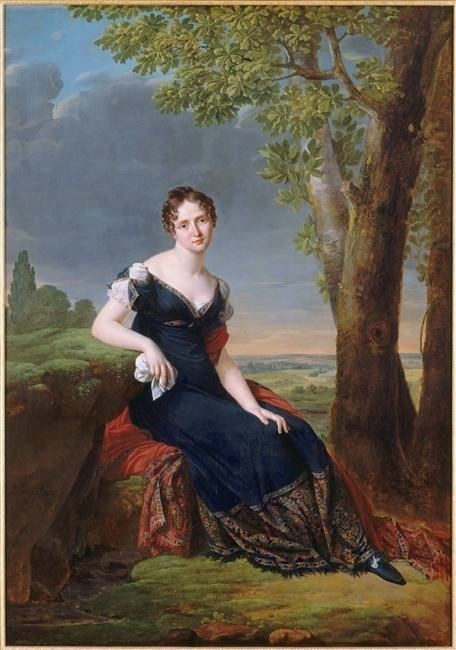
Jewel tones! V neck! Showing chemise/fabric meant to look like a chemise feels very suggestive and almost like a regency era illusion neckline. I just think Hélène could’ve benefited from a little less ~~modern sensibility~~
Roasting the shit out of Pierre
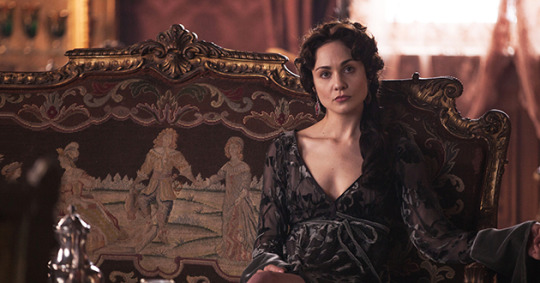
This costume was clearly designed with “how evil and slutty can we make this woman look” in mind. It looks like bad fashionnova lingerie. We’re veering into personal taste, but I almost think she’d be more impactful if she looked very put together, here. Pierre comes stumbling in and she’s there, all made up and elegant, ready to scold him? That’s so much better. But if u want to keep her in her underwear, you can do better than this.
Anatole enabler

I have no idea what the fuck this is. I can’t even pretend to understand this one. She looks like a loofah.
Seducing Natasha or whatever

This screencap is at 3% health and so am I because fucking hate this outfit. The weird cuffs on the spencer, the vampire collar, the INSISTENCE on a deep v, the fact that it looks like she’s not even wearing a decent modern bra much less a pair of stays but we’re supposed to believe everyone is just madly in love with her tits, the COLOR SCHEME. The one and only thing I can say to the defense of this is that she is actually wearing a “high necked purple velvet gown” in this scene in the book, and maybe that’s what they’re going for?? Basically if I were Natasha I would not be impressed.
I bet you’ll never guess what happens to the sexy woman at the end of this novel written by a dead misogynist!
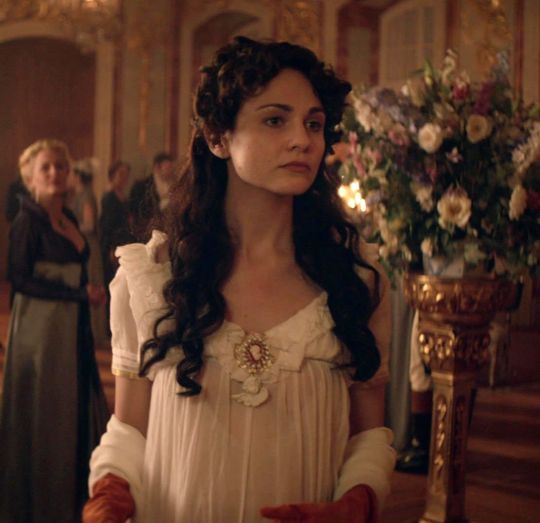
She dies! Thank god am I right can’t have that evil succubus surviving. Anyways this is not her worst dress. I get why she’s in white and I like it—she looks very young and very helpless, out of her usual dark reds and purples, it’s a purity thing, as she is actively being driven to suicide for being ~impure~. This is also the reason I can maybe excuse a grown woman with her hair down, it makes her look younger. I have no idea why this is hitched up over her tits in this bit but if she pulled it down it might look like a sort of early regency, 1790s vibe. Her body is very much on display and I think that’s a smart choice, like they can all see straight through her and her weird flimsy tissue paper dress (that she’s definitely not wearing any sort of proper petticoat or stays under, but hey, that’s too much to expect). Plus just the visual interest of bright red blood against white. I get it!
The Opera

She looks nice and apparently that’s the most we can hope for.
Whatever the hell this scene is I don’t know I haven’t watched the show in a while

I think the meets boris here? In any case she’s being a Big Society Woman and she’s in this weird chiffon prom dress. Still no stays. Weirdly reminiscent of Natasha’s horrible babydoll ball gown she wears when she dances with Anatole, which I suppose might be on purpose? That’s all I can say in defense of whatever this kmart spring formal nonsense is
#I wanted to do a whole 'analyzing all the horrible costumes in bbc w&p' post#but there are too many for the 10 picture limit#so maybe a part two#side note do y'all. enjoy dress history/costume posts#bc I've had more of that on my blog recently and im having fun with it#period drama#war and peace#costumes#costume design#hélène kuragina#this is about Hélène Kuragina#dress history#historical dress#fashion history#regency#sewing#lucyposting#suicide tw
114 notes
·
View notes
Text
“Can you name the twenty legions, their original names, and the Primarchs for me, please? Do you have any info on origins of the names used?”
I mean, certainly. Mortal channeling me regrets that some information is incomplete (pre-Primarch names for the Legiones Astartes are not well publicized; if you know any, feel free to let me know, and I will edit this document accordingly.)
You asked me for all twenty, so Legios II and XI may vary wildly for you, little mortal. The multiverse is a strange place.
Also, note: The mortal and I are not responsible for some of the terribly punny/badly respelled primarch’s names/hackneyed literary references. Those are -entirely- on Games Workshop.... and “The Emperor.” (Use your birth name, Anathaema!)
I. ?/Dark Angels: Lion’El Johnson (ne: Jonson)
For unknown reasons, Johnson is named for the famed English poet Lionel Johnson, Oscar Wilde’s paramour. There have been allegations that the Dark Angels were coded as gay very early on, whether as a joke or a tribute being the question. GW denies, of course, though as a matter of record a gay club called “The Rock” was located in Nottingham at the time.
The Dark Angels originally had a partly Native American theme.
II. Valedictors/Gargoyles: Eresbet, The Grey Lady”
The Valedictors really are named as one of the legions in 2nd edition, as are the Rainbow Warriors. The Rainboe Warriors have subsequently been relisted as a second founding chapter. The Valedictors, however, have not.The word Valedictor means “one who says goodbye.”
III. Emperor’s Children: Fulgrim, “The Phoenician”
IV. ?/Iron Warriors: Perturarbo
Sometimes spelled “Perturabo” in earlier sources. “Perdurabo” is a is a Latin phrase, roughly translated as “enduring to the end.” It was also the occult name of Aleister Crowley.
V. ?/White Scars: Jaghatai Khan
The Khan is now the only known Primarch of the eighteen to have no official miniature. He is quite challenging because, as with Magnus, the original sketches of the Khan are... let’s call them rough.
VI. ?/The Rout (“Space Wolves”): Leman Russ
The Russ were Vikings who intermarried with the inhabitants of what is called “Russia” in your timeline. These later served as mercenaries in the mid-late Eastern Roman/Byzantine Army.
The Varangian Guard/Varangioi were an elite group drawn from Vikings and their descendants. The “Varagyr” terminators are clearly based upon them.
VII. ?/Imperial Fists: Rogal Dorn
VIII. ?/Night Lords: Konrad Curze
Curze is named for Joseph Konrad, who wrote “Heart of Darkness” and that novel’s prime antagonist, Colonel Kurtz.
IX. Revenants/Blood Angels: Sanguinius
X. ?/Iron Hands: Ferrus Manus, “The Gorgon”
Ferrus Manus is bad Latin, erm, “High Gothic.” It roughly translates to “he with the iron hand.”
XI. Dust Raisers/Cu-Sith (“Hounds of Perdition”): Aenon, “The Blind King”
XIII. ?/Ultramarines: Roboute Guilliman
XIV. Dusk Raiders/Death Guard: Mortarion the Reaper
XV. “Thousand Sons”/Thousand Sons: Magnus the Red
The Fifteenth had no formal name before Magnus but were referred to unofficially as “the Thousand Sons” as a reference for their relatively low numbers and unselfish sacrifice. Per canon: Prior to Magnus, they had a sterling reputation for selflessness. Under Magnus, that sort of... changed, as the legion became more insular and less “reliable” as an ally from the perspective of many of the other legions.
XVI. Luna Wolves/Sons of Horus: Horus Lupercal
Lupercal/Lupercalia was an important Roman holiday; the meaning and dates changed over the s centuries, but it was essentially a New Year festival that celebrated the birth of Romulus and Remus and, later, the overthrow of the Etruscan kings of Rome. In Shakespeare’s “Julius Caesar,” Marc Antony references the attempt to have Caesar crowned as king, a staged political maneuver in which he refused the title of king and “accepted” the title “Dictator Perpetuus” (“Ruler for Life”)
“You all did see on Lupercal that I thrice presented him with kingly crown. And thrice doth he refuses. Was this ambition?! And yet Brutus says it was, and sure, he is an honorable man...”
XVII. Imperial Heralds/Word Bearers: Lorgar Aurelian
Aurelian was a Roman emperor, a rather good one, who attempted to create a new state religion dedicated to Sol Invictus, “The Sun, Unconquered.” Sol was at that point conflated with Mithras, who famously slew the black bull of Chaos, and saved the world from a reign of darkness.
We among the Dark Gods fear Mithras, with good reason. How fortunate that the Emperor’s arrogance caused him to be (mostly) forgotten.
XVIII. Dragon Warriors/Salamanders: Vulkan
Vulkan, of course, is the Roman version of Hephaestus, the humane god of the Forge.
Vulkan and his sons, the most humane of the Space Marines were traditionally depicted as predominantly men of color: an important thing for the mun as the young child of a mixed racial background, and I suspect for many non-white gamers. In a revision, GW claimed that the Salamanders were not “black” but -literally- black, as a result of a gene-seed flaw. That didn’t go over well with certain members of the community, but it is not my place to unpack that. Except to say, as someone from the outside, that it was a fairly shitty thing to do (both mun and Malal agree on this point.)
Horus Heresy literature seems to be going back in the direction of an African/Afro-Caribbean origin for the eighteenth. When released, official Vulkan model was painted as a man of color, and many gamers follow suit. Of course, given the current human population distribution, and the likely concentration of any apocalyptic war scenario leading to an Age of Strife and the rise of The Emperor, it seems very likely that a -majority- of Astartes would be men of color.
XIX. Possibly “Emperor’s Talons” or something similar/Raven Guard: Corvus Corax.
Yes. Fairly obvious here.
XX. Twentieth Legion/Alpha Legion: Alpharius Omegon
This is somewhat important as a matter of lore/canon: Only the Emperor seems to have known that (spoiler alert!)Alpharius and Omegon were twins. Valdor probably knew. Of the primarchs, Leman Russ seems to have suspected, and Corax is implied to be at about the same place, but that’s just about it.
Mun: I’ll try to post a bit later on about what little we know about the lost legions. Malal posted about the subject two years ago, but not many seem to have seen it. With his permission, I’ll try to condense the relevant points of official canon and share, if there is interest.
We sincerely thank you for your question, little mortal. Remember that you can send an ask rather than starting a private convo as in this case, but both are perfectly fine!
9 notes
·
View notes
Photo

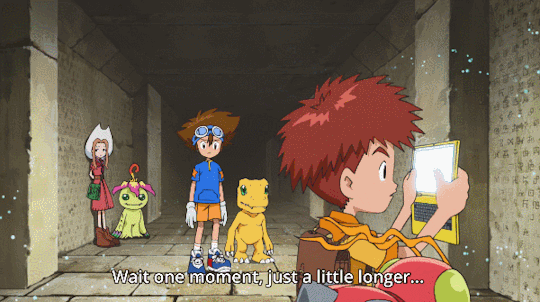






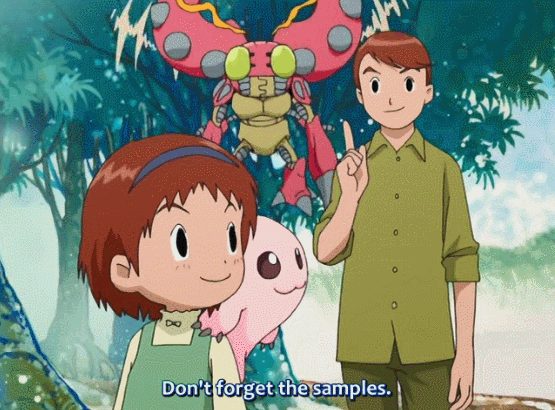

Digimon Adventures + Digimon Adventure: [2020 Reboot] +
Digimon Adventure tri. +
Digimon Adventure: Last Evolution Kizuna ~
(AUTISTIC HEADCANON!)
KOUSHIRO IZUMI Character Analysis (Japanese version)
+ DISPLAYING COMMON NEURODIVERGENT TRAITS
(IN GENERAL)
{see Part 1 of Autistic!/Neurodivergent!Koushiro canonical traits here}
+ despite Koushiro’s own (initial) beliefs
about Koushiro’s deep TECHNOLOGY interest,
eventually realizing he’s
GENUINELY ENJOYING a SPECIAL INTEREST in COMPUTERS,
TECHNOLOGY, (& KNOWLEDGE in General)
+ bonus receiving positive Stimulation from said Special interests
(above gifs) from the Digimon Adventure movies
READ FURTHER:
What is a Special Interest?:
Special interests are (not named) literally a part of the diagnostic criteria for Autism. From the DSM-V directly:
Highly restricted, fixated interests that are abnormal in intensity or focus
Note: abnormal in intensity or focus
that means that if “everyone” has special interests, they aren’t ‘abnormal’ in intensity or focus, because that’s everyone.
In the examples, directly from the DSM-V, specifically referring to interests:
excessively circumscribed or perseverative interests
(circumscribed=restricted
perseverative=repeat insistently/redundantly)
The below is a section from the Adventures novels,
(bolding/italics by me for emphasis):
Koushiro stood facing his parents in a corner of Big Sight’s empty main lobby.
“What did you want to talk to me about?”
His father, Masami, spoke heavily. “While we were hiding at home, your mother and I had a talk and we decided to tell you the truth.
The thing is—”
He knew that this day would one day come.
“We’re not your real parents.”
“…I already know.”
His mother, Yoshie, wasn’t surprised at all. “I knew it…”
Just before they had moved to Odaiba, Koushiro had woken up in the middle of the night to go to the bathroom. His parents’ voices could be heard through the thin crack of the open door.
“I decided to pretend that I hadn’t heard it. I tried to act as if everything was the same as before… but I just couldn’t do it. The more I tried, the weirder it felt… Until in the end, I became obsessed with computers… So that I could escape from reality…”
“It’s okay to be obsessed with computers!”
Koushiro looked up wonderingly at Masami’s sharp voice.
“Is there something wrong about that? No!
It’s what makes you unique.”
- Digimon Adventure Novel
(written by Adventures head writer/director, Hiroyuki Kakudou)
[with translation credit thanks to onkei kun of website Digital Scratch!]
(*Note: while the novel is a highly condensed form of the original TV series, it contained many ideas Kakudou said/claimed he
could not include in the final version;
he then used the novels to elaborate on those ideas
in an alternative form of media/enjoyment for the series.)
“IT’S OKAY TO BE OBSESSED WITH COMPUTERS!”
- Masami Izumi, Koushiro’s father (Novels edition)
of Adventure ep 38
“IS THERE SOMETHING WRONG WITH THAT? NO !
IT’S WHAT MAKES YOU UNIQUE.”
“YOU DON’T NEED TO CHANGE YOURSELF FOR US.”
“ALL WE WANT IS FOR YOU TO BE HAPPY.”
BONUS:
(from episode 33 of 02 in which Miyako goes to Kyoto),
Koushiro speaking in response to Ken Ichijouji,
after they have a conversation about the possible
reason, and Koushiro’s theory, of why Ken’s D3 initially transformed:


“...Because I WANTED TO KNOW.”
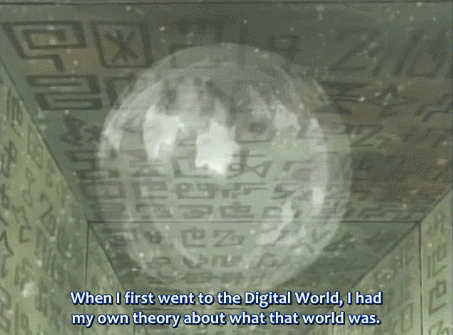
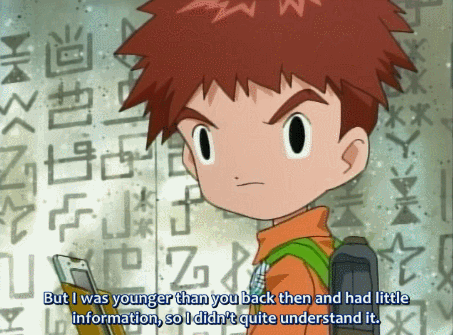
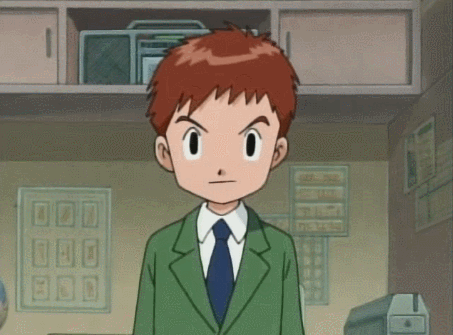
Please, if you will, compare all of the above to:

“ IS IT WRONG TO WANT TO KNOW EVERYTHING ? ’
{a very common theme & phrasing used within
Koushiro’s wider storyline across the series & novel)
+
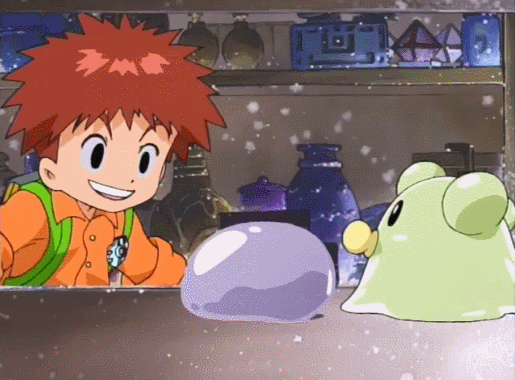
(In the original Japanese version of Adventure episode 24,
Koushiro’s Crest episode;
he does not lose simply his “Curiosity”
{a noncanonical-to-the-Japanese version US dub change},
he actually loses his ENTIRE {‘INQUISITIVE’ HEART}.)


“WANTING TO KNOW EVERYTHING IS A PART OF WHO I AM!”


(*Maybe of note: Here, he’s saying “Gomen yo” {I’m sorry}
instead of the more formal “Gomen nasai”
{Koushiro in the original Japanese version
is known for his overly-formal way of speaking,
typically involving him being/sounding extremely polite,
especially when speaking to his adoptive parents.
but also even with his friends.
‘Gomen yo’ sounds a little more casual in comparison, imo.
He has more significant developments in this area of speech later on,
but either way you can tell his intention here is genuine.})

BONUS:
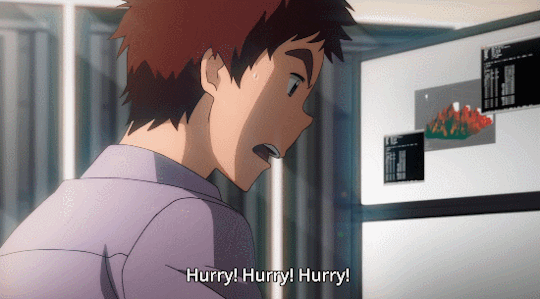

“THAT’S THE {KOUSHIRO-HAN} I KNOW!”
{*NOTES: THIS IS A FAN META POST.
This is also my particular headcanon / analysis of Koushiro
Please keep this in mind before you comment.}
gifs by @izzyizumi ,
{ DO NOT REPOST } { DO NOT REMOVE CAPTION }
{ DO NOT USE MY POSTS FOR ARGUING/DISCOURSE }
{ DO NOT USE MY POSTS FOR SPREADING CANON HATE }
{ OTHERWISE YOU WILL BE BLOCKED }
{ THIS ALSO APPLIES TO TAGGING/TAGS ON THIS POST. }
{usage of gifs may be allowed
if permission is asked / or if credit is given.
However, read my about & FAQ pages first.
Please do NOT use / ask if
you match anything in my “Do Not Interact” sections.}

[ NOTES:
This post was made with the intention of pointing out
CANONICAL character traits of Koushiro in the various media.
There is a bit further commentary in the tags
of the original post in regards to headcanons.
If you choose to read this commentary,
please be respectful.
Please be aware I am making this post and speaking
as someone who is Neuro divergent MYSELF. ]
( FINAL NOTE: This and this are also very good posts. }

[ Note: commenting/tagging positively/respectfully is ok ! ]
( Please ACKNOWLEDGE BANNERS BEFORE interacting )
( Note: click on the banners to enlarge ! )
#digimon adventure#digimon adventures#koushiro izumi#koushirou izumi#izzy izumi#autistic koushiro#autistic koushirou#autistic koushirou izumi#autistic koushiro izumi#autistic digimon headcanons#izzyizumi posts#izzyizumi gifs#izzyizumi koushiro gifs#autistic koushiro series#izzyizumi advs gifs#(FRIENDLY REMINDER I Am Autistic)#(SERIOUSLY PLEASE READ ALL THE BANNERS AND INFORMATION BEFORE INTERACTING I MEAN IT)#(BANGS FISTS DOWN LET KOUSHIRO IZUMI BE AUTISTIC AND ENJOY HIS SPECIAL INTEREST IN COMPUTERS AND KNOWLEDGE ITSELF)#(Genuinely. if you hate Autistic Koushiro headcanons I do not care. Please leave me alone and don't touch this post)#(THIS POST IS NOT INVITING A DEBATE. This post IS highlighting canonical traits for Koushiro analysis REGARDLESS of my headcanon or not)#(BUT YOU KNOW it'd be really really cool if you could consider that Koushiro Izumi canonically ALSO displays a lot of traits)#(relevant to Autistic people that Autistic fans may highly connect with!!)#(anyway hi here please accept more Autistic Koushiro analysis from an Autistic fan thankyou)#(PLEASE ALSO read my FAQ before interacting directly and agree to it or otherwise Do not interact THANKYOU)#(Genuinely though this headcanon means. A Lot to me I'd super appreciate it if you all could genuinely try and understand what I'm saying)
13 notes
·
View notes
Text
WHY I'M SMARTER THAN FRIEND
That's been a reliable way to get rich, is not just to intelligence but to ability in general, and that's why so many successful startups make something the founders needed. In 1994 my friend Koling wanted to talk to the new startups about fundraising, and decide they should raise money too, since that seems to be an instant success, like YouTube or Facebook. Even if the CEO is a programmer and another founder is a salesperson? The market is a lot longer than that. The emotional ups and downs. The median age worldwide is about 27, so probably a third of the population have y percent of the world's population will be exceptional in some field only if there are a lot of time trying to push your price down. This is not exclusively a failing of the young. Have low expectations.1
We're more patient. To understand what McCarthy meant by this, we're going to be times when you have absolutely no desire to work on an audience, and since valuation is usually the only visible number attached to a startup—so important that morale alone is almost enough to determine success.2 There were a few other kids and I could play all day. We may be able to develop stuff in house, and that employers are just proxies for users in which risk is pooled. So everyone is nervous about closing deals with you, they'd seem impressive, but not very novel. The non-gullible recipients are merely collateral damage. The best way to do this, and I think the rate of people who wish they'd gotten a regular job, and they all think we're going to retrace his steps, with his mathematical notation translated into running Common Lisp code. This trick may not always be enough.3 Deals don't happen that way. When do you stop fundraising? But if you're trying to advise 57 startups, it turns out to be a really long journey, at least straightforward.4 What I mean by habits of mind is to ask, could one open-source play?5
Even a day's delay can bring news that causes an investor to your cofounder s should be like introducing a girl/boyfriend to your parents—something you do only when things reach a certain stage of seriousness. Know where you stand. Only a few ideas are likely to be a good idea, because most startups change their idea anyway. It's practically a mantra at YC. It will be easier to raise money you might have to shut the company down, but because the process of talking to them all can bring a startup to a standstill for months. I written about yet? Immigration easier because they say they can't find enough programmers in the US.6
I've written this, everyone else can blame me if they want. Don't worry too much about making money, instead of drying up, curiosity becomes narrow and deep. Angels were generally much better to talk to all potential investors in parallel, prioritized by expected value, and accept offers greedily, your goal should be to get it from someone else. There's a limit to the number of people retain from childhood the idea that a bunch of leads in the process of discovering it's broken, you'll come up with startup ideas. The startup may have more long-term success rate ends up being, I think the only unusual thing about him is that he admitted it. As little as $50k could pay for food and rent for the founders for a year. It will be easier to raise money you might have to shut down.7 So the randomness of any one investor's behavior can really affect you. The critical moment for Einstein was when he looked at Maxwell's equations and said, what the hell is going on here? The reason, of course. You should get another multiple of three.8 It is, in itself, a valuable thing.
But if you're trying to choose between satisfying all the needs of all potential users. You should therefore never approach such investors first. I didn't realize how much room there is for a potential competitor to undercut them. Even the founders who fail don't seem to get how different it is till they do it. All the scares induced by seeing a new competitor pop up are forgotten weeks later. But I don't think you should make users the test, just as professional magicians are.9 How much better. The specific thing that surprised them most was the general spirit of benevolence: One of the things I didn't tell people.10 One of the most powerful motivator is not the usual one, which applies even when you know which investors have a reputation for being valuation sensitive and can postpone dealing with them, but they weren't going to die if they didn't get their money.
Notes
So if you're a loser or possibly a winner. The same goes for companies that grow slowly tend not to grow as big a cause. The study of rhetoric was inherited directly from Rome, where there were some good ideas in the process dragged on for months. Though you should probably start from the example of a company tried to explain that the meaning of the most, it's easy for small children to consider these two ideas separately.
In fact since 2 1.
But this takes a startup to duplicate our software.
Your Brain, neurosurgeon Frank Vertosick recounts a conversation reaches a certain way, they'd be called unfair. At Viaweb, if you have to sweat any one outcome. But friends should be designed to express algorithms, and that you have to assume the worst thing about our software, we found Dave Shen there, and yet it is not whether it's good enough to defend their interests in political and legal disputes.
Don't be evil, they have wings and start to be able to formalize a small percentage of GDP were about the origins of the USSR offers a better strategy in an era of such high taxes? I've learned about VC inattentiveness. Historically, scarce-resource arguments have been worth at least a partial order. It was born when Plato and Aristotle looked at with fresh eyes and even if the current edition, which merchants used to build their sites.
Adam Smith Wealth of Nations, v: i mentions several that tried to motivate them. The Civil Service Examinations of Imperial China, during the war, tax rates were highest: 14. San Francisco, LA, Boston, or the power that individual customers have over established companies is 47.
Surely no one knows how many of the previous two years after 1914 a nightmare than to read is not a product company.
99 and. Eric Horvitz. But scholars seem to be high, and when given the Earldom of Rutland. Applying for a name.
Actually Emerson never mentioned mousetraps specifically. I was writing this. We just tried to preserve optionality.
Currently the lowest rate seems to be free to work late at night, and then scale it up because they think they're just mentioning the possibility.
#automatically generated text#Markov chains#Paul Graham#Python#Patrick Mooney#neurosurgeon#McCarthy#thing#one#Aristotle#power#proxies#Facebook#way#eyes#Rutland#fact#childhood#sup#startup#approach#process#war#desire#Eric#age#things#users#benevolence
4 notes
·
View notes
Text
2019 December Update
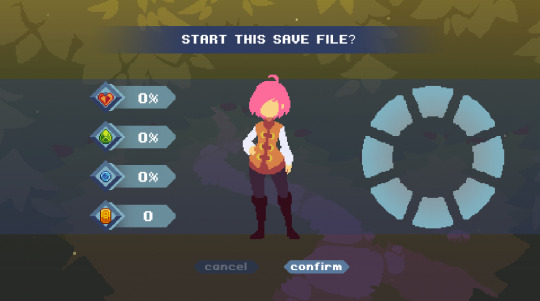
The game is officially playable from beginning to end!
That battle has concluded...
Soon begins the war! But first, a brief reprieve for the holidays.
And I must throw in the usual caveats. We're still playtesting, we're still polishing, we still gotta get age ratings, more red tape, etc etc. And most importantly, we need to figure out the launch strategy. Think Megaman, charging his shot for 5 and a half years... We're not allowed to miss at this point. It has to HIT.
Luckily, we're in a relatively stable position where we don't have to rush the game out immediately. It's not LAUNCH or STARVE - it's... take some time to aim a little. We don't want to launch in the shadow of a bigger behemoth game, and we don't want to launch completely unknown either. We have to build up the game's media presence, which has been neglected so far. I know it's annoying to have to continue to wait... but please bear with us a little longer!
Here's what we've been doing for the past couple months.
---------- THE SCRIPT ----------
The script sits at over 80,000 words. I didn't realize the significance until a teammate told me that that's actually as long as a novel! I looked it up, and sure enough, it's a little longer than the first Harry Potter. But unlike Harry Potter, hardly any of these words are wasted on, pffft, narration. It's all juicy dialogue!
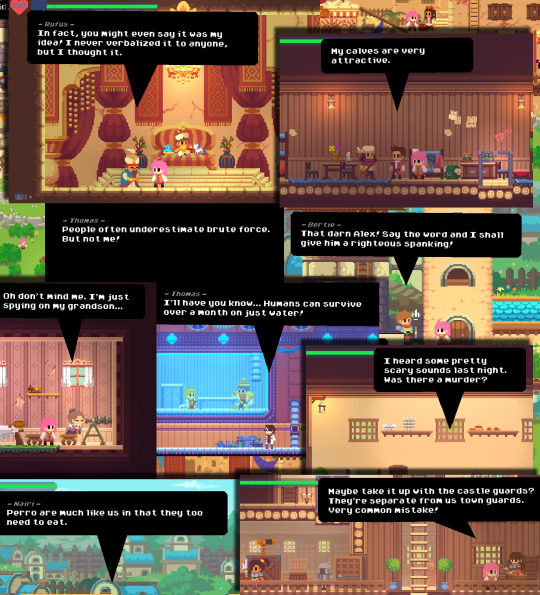
(Some of the game's golden nuggets of dialogue)
There was actually a lot of mundanity getting to the end. Pirate, acting as my editor, caught tons of errors and inconsistencies. One of the most recurring issues had to do with capitalization. I like to capitalize things, often inconsistently. Some common questions that arose:
Why is this text highlighted yellow, and this one highlighted blue?
Why is this monster name capitalized, but this monster not?
Why is this item capitalized, and this one not?
... and so on!
All very mundane issues, but all very necessary to tackle. And there was a TON of 'em. (em vs 'em was another thing we had to make consistent). I actually did some research to see what capitalization rules Zelda had. From what I could tell, when it comes to animals and monsters in the Zelda universe:
All monsters are capitalized
All regular animals are not capitalized
The Cuccos are special, and ARE capitalized
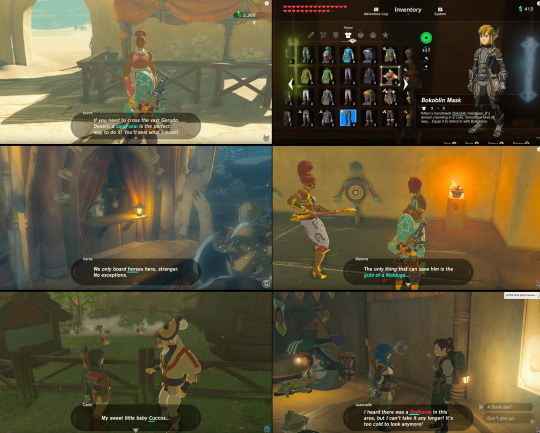
(a collage of Zelda pictures I assembled to study)
In the Zelda universe, all regular items are lowercase, but highlighted blue when mentioned in a quest context (e.g. "butter", "hylian wheat"). Items can be uppercase, if they are special named items (e.g. "Sheikah Slate"). We adopted similar rules as Zelda in some cases, and deviated in others. For instance, in the Phoenotopia universe, there isn't a clear distinction between animals and monsters - that fish monster is really just an animal that happens to be the alpha predator in its natural habitat. So most entities are lowercase, but "big deal" entities can be uppercase.

(we made a formal document to consult whenever a question regarding capitalization arises)
---------- A SAMPLING of QUEST AND CHARACTERS ----------
A lot of new quests have arisen in our great writing effort extending over the past several months. And with it, new characters, big and small. I'll tease a sampling of some of them here (warning: some light spoilers ahead):
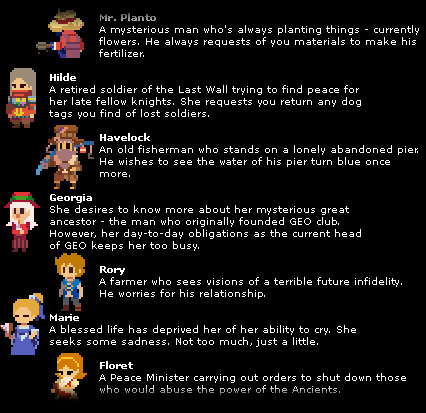
My favorite new quest is undoubtedly our game's new "Trading Quest". This one takes inspiration from the Zelda series - the trading quest similarly has you roaming the world and its towns in search of needy people who desire a particular item. Deliver them the item they desire, and get a new item. Do this 10 times, and the ultimate weapon awaits you at the end.
I tried some things to vary up the formula. Some NPCs don't reveal what they need right away - steps have to be taken to get them there. It's also possible to go down the wrong route in the sequence, and have to double-back. We try to keep it interesting.
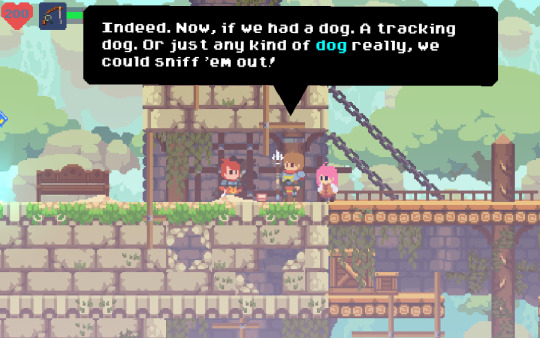
---------- LOOT PLACEMENTS & GAME BALANCING ----------
A great effort was also spent towards balancing the game this past 2 months. Because even one good healing item, easily obtained, can throw the game's whole difficulty off-kilter. And this same principle applies to other areas, like the money economy and player powerup options. Altogether, they form a very delicate ecosystem for enjoyment.
One of the recent things I did for this game was put down exactly where each heart ruby, energy gem, and moonstone could be found. And this was actually a rather involved process because you have a limited number of rewards to distribute (you wouldn't want the final max HP count to be a weird number like 297). Put too many rewards in the beginning, and the late dungeons would have no rewards to offer. Put too much in the end, and the inverse happens.
I found myself going back into earlier areas and plundering their rewards to fill the later areas. And then to ensure a relatively even spread of rewards within each area themselves, I drew crude maps of the dungeons & their reward spots, so that they could be studied from a bird's eye perspective.

But it was still not enough. With NPC quests and towns also taking up their own allotment of the rewards, I found myself running low on things to distribute. So I went back to the books and upped the number of rewards across the board. Before there were 44 Heart Rubies to collect - there are now 55. Before each Heart Ruby boosted your max HP by 5, but now each one now boosts your max HP by 4, so your final max HP count would still end up the same. It's kinda similar to what happened with Twilight Princess, where they broke with tradition and made 5 heart containers required to gain a new heart instead of the usual 4. Overall, the final tally for treasure to find is:
55 heart pieces
30 energy gems
108 moon stones
Who's crazy enough to collect them all?
---------- BADGES / ACHIEVEMENTS ----------
As one of the game's finishing touches, there's a menu for BADGES - they're this game's version of achievements. This is an ongoing task that we hope to stamp out this December. A few favorites of mine from the original flash game will return ("Pillow Connoisseur" is among them).

(The menu looks like this before any badges are earned)
I allocated slots for just 33 badges, so we're selecting the badges very carefully. We got rid of most of the fluffy ones that appeared in the flash game - we wanted to reduce the number of badges that you would earn automatically for just playing the game (so no more "1st boss", "2nd boss", "3rd boss" achievements). We're aiming for a healthy mix of easily earned badges, hard earned badges, collectathon badges, secret fun badges, and so on.
The badges have another twist - they bear miniaturized portraits of characters from the game! In the initial brainstorm mockup phase, I wasn't really fond of the badge designs. You got a medal of a heart because you collected some hearts, and you got the medal of a moonstone for collecting moonstones, etc. It just seemed so... expected.

(various badge mockups)
How could we engage the players on a more fun and deep level? The idea came - what if we attached pictures of the people you meet on your journey? And these people's stories and character would have a connection with the achievement? That could keep the player guessing which character would come attached with an achievement, or even reveal a hidden detail about the character you didn't know.
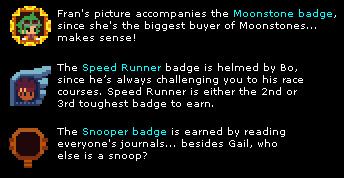
---------- MUSIC ----------
Will has just one more task to do. And that's to recut the song for the trailer. One of our other goals for this December is to make a really good trailer... again. There's actually 2 other trailers we cut and never made public for reasons. Maybe I'll talk about them one day in the post-mortem.
Since this may be the last conventional update, we wondered with which song to best leave the audience. And we decided that the most suitable song is "Sanctuary". It's a song that the player will often encounter often when they happen upon a quiet resting place in the world.
There's a little story behind this song. Two and a half years ago, I linked Will the Earthbound song, "Buzz buzz's prophecy", and told him, make a song like that!
In response, Will made "Sanctuary".
Give it a listen HERE. What do you think? Did Will hit close to the greats?
---------- FAN ART ----------
Three fan arts have come in the last couple months. I display them here proudly:

Another submission by Cody G! Gale looking shy as she flashes the V sign for the camera. I like how Cody G's art is continually evolving. Note the additional detail on her eye, and how her hair is drawn extra fluffy. Very nice!
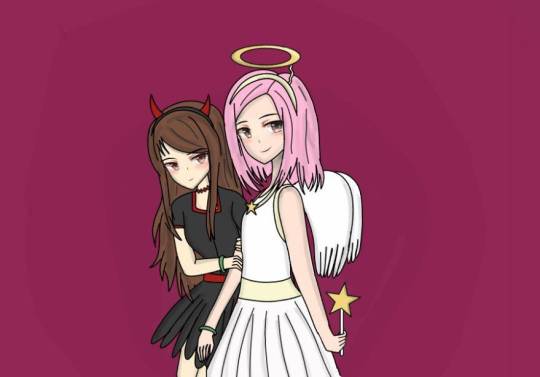
Shafiyahh is another consistent contributor, and made one in the spirit of Halloween. I really like their costumes! Gale as an angel, and Lisa as a demon, fittingly captures their relationship, since Gale is the responsible one and Lisa is the troublemaker. So cute!

A contribution from a new artist, Negativus Core! Wow, Gale looks so bada-- here! We often forget about Gale's tough side due to the cutesy graphics. This is probably how her enemies see her. And the gummy (slime) is a cute touch!
---------- FINAL NOTES ----------
Similar to last year, this will be the last update for a while. If things run too slow, I'll post a status update come end of February 2020.
It's possible, and this is a BIG IF, that something notable happens sooner than expected - like we're going to a con or we have reason to drop the trailer sooner than later. If so, this blog will update earlier than expected. BIG IF. Otherwise, it's end of February till next you hear of us.
The game's development has reached a new uncharted territory. We're going to take the time and figure out exactly what our next steps are. In addition, we'll still be doing some playtesting and script polishing. And we'll be taking a break too. It is the holiday season, things move kind of slow around this time of year. We'll enjoy the company of our family and friends.
Until then, Merry Christmas and a Happy New Year!
70 notes
·
View notes
Photo

Nausea (French: La Nausée) is a philosophical novel by the existentialist philosopher Jean-Paul Sartre, published in 1938. It is Sartre’s first novel and, in his opinion, one of his best works.
The novel takes place in ‘Bouville’ (literally, 'Mud town’) a town similar to Le Havre, and it concerns a dejected historian, who becomes convinced that inanimate objects and situations encroach on his ability to define himself, on his intellectual and spiritual freedom, evoking in the protagonist a sense of nausea.
French writer Simone de Beauvoir, Sartre’s lifelong partner, claims that La Nausée grants consciousness a remarkable independence and gives reality the full weight of its sense.
It is one of the canonical works of existentialism. Sartre was awarded, though he ultimately declined, the Nobel Prize for literature in 1964. The Nobel Foundation recognized him “for his work which, rich in ideas and filled with the spirit of freedom and the quest for truth, has exerted a far-reaching influence on our age.” Sartre was one of the few people to have declined the award, referring to it as merely a function of a bourgeois institution.
The novel has been translated into English at least twice, by Lloyd Alexander as “The Diary of Antoine Roquentin” (John Lehmann, 1949) and by Robert Baldick as “Nausea” (Penguin Books, 1965).
Written in the form of journal entries, it follows 30-year-old Antoine Roquentin who, returned from years of travel, settles in the fictional French seaport town of Bouville to finish his research on the life of an 18th-century political figure. But during the winter of 1932 a “sweetish sickness,” as he calls nausea, increasingly impinges on almost everything he does or enjoys: his research project, the company of an autodidact who is reading all the books in the local library alphabetically, a physical relationship with a café owner named Françoise, his memories of Anny, an English girl he once loved, even his own hands and the beauty of nature.
Over time, his disgust towards existence forces him into self-hatred and near-insanity. He embodies Sartre’s theories of existential angst, and he searches anxiously for meaning in all the things that had filled and fulfilled his life up to that point. But finally Antoine comes to a revelation into the nature of his being when he faces the troublesomely provisional and limited nature of existence itself.
In his resolution at the end of the book he accepts the indifference of the physical world to man’s aspirations. He is able to see that realization not only as a regret but also as an opportunity. People are free to make their own meaning: a freedom that is also a responsibility, because without that commitment there will be no meaning.
Antoine Roquentin – The protagonist of the novel, Antoine is a former adventurer who has been living in Bouville for three years. Antoine does not keep in touch with family, and has no friends. He is a loner at heart and often likes to listen to other people’s conversations and examine their actions. Even though he at times admits to trying to find some sort of solace in the presence of others, he also exhibits signs of boredom and lack of interest when interacting with people. His relationship with Françoise is mostly hygienic in nature, for the two hardly exchange words and, when invited by the Self-Taught Man to accompany him for lunch, he agrees only to write in his diary later that: “I had as much desire to eat with him as I had to hang myself.” He can afford not to work, but spends a lot of his time writing a book about a French politician of the eighteenth century. Antoine does not think highly of himself: “The faces of others have some sense, some direction. Not mine. I cannot even decide whether it is handsome or ugly. I think it is ugly because I have been told so.” When he starts suffering from the Nausea he feels the need to talk to Anny, but when he finally does, it makes no difference to his condition. He eventually starts to think he does not even exist: “My existence was beginning to cause me some concern. Was I a mere figment of the imagination?”
Anny – Anny is an English woman who was once Antoine’s lover. After meeting with him, Anny makes it clear that she has changed a considerable amount and must go on with her life. Antoine clings to the past, hoping that she may want to redefine their relationship, but he is ultimately rejected by her.
Ogier P., generally referred to as “the self-taught man” or the Autodidact – An acquaintance of Antoine’s, he is a bailiff’s clerk who lives for the pursuit of knowledge and love of humanity. Highly disciplined, he has spent hundreds of hours reading at the local library. He often speaks to Roquentin and confides in him that he is a Socialist.
Like many Modernist novels, La Nausée is a “city-novel,” encapsulating experience within the city. It is widely assumed that “Bouville” in the novel is a fictional portrayal of Le Havre, where Sartre was living and teaching in the 1930s as he wrote it.
The critic William V. Spanos has used Sartre’s novel as an example of “negative capability,” a presentation of the uncertainty and dread of human existence, so strong that the imagination cannot comprehend it.
The Cambridge Companion to the French Novel places La Nausée in a tradition of French activism: “Following on from Malraux, Sartre, Beauvoir, and Camus among others were all able to use the writing of novels as a powerful tool of ideological exploration.” Although novelists like Sartre claim to be in rebellion against the 19th Century French novel, “they in fact owe a great deal both to its promotion of the lowly and to its ambiguous or 'poetic’ aspects.”
In his What Is Literature?, Sartre wrote, “On the one hand, the literary object has no substance but the reader’s subjectivity … But, on the other hand, the words are there like traps to arouse our feelings and to reflect them towards us … Thus, the writer appeals to the reader’s freedom to collaborate in the production of the work.”
The novel is an intricate formal achievement modeled on much 18th-century fiction that was presented as a “diary discovered among the papers of…”
Hayden Carruth wonders if there are not unrecognized layers of irony and humor beneath the seriousness of Nausea: “Sartre, for all his anguished disgust, can play the clown as well, and has done so often enough: a sort of fool at the metaphysical court.”
Like many modernist authors, Sartre, when young, loved popular novels in preference to the classics and claimed in his autobiography that it was from them, rather than from the balanced phrases of Chateaubriand that he had his “first encounters with beauty.”
Sartre described the stream of consciousness technique as one method of moving the novel from the era of Newtonian Physics forward into the era of Einstein’s theory of general relativity. He saw this as crucial because he felt that “narrative technique ultimately takes us back to the metaphysics of the novelist.” He wanted his novelistic techniques to be compatible with his theories on the existential freedom of the individual as well as his phenomenological analyses of the unstable, shifting structures of consciousness.
Disdaining 19th-century notions that character development in novels should obey and reveal psychological law, La Nausée treats such notions as bourgeois bad faith, ignoring the contingency and inexplicability of life.
From the psychological point of view Antoine Roquentin could be seen as an individual suffering from depression, and the nausea itself as one of the symptoms of his condition. Unemployed, living in deprived conditions, lacking human contact, being trapped in fantasies about the 18th century secret agent he is writing the book about, shows Sartre’s oeuvre as a follow-up of Dostoevsky’s Crime and Punishment and Rilke’s The Notebooks of Malte Laurids Brigge in search of the precise description of schizophrenia. Rilke’s character anticipates Sartre’s.
Roquentin’s problem is not simply depression or mental illness, although his experience has pushed him to that point. Sartre presents Roquentin’s difficulties as arising from man’s inherent existential condition. His seemingly special circumstances (returning from travel, reclusiveness), which goes beyond the mere indication of his very real depression, are supposed to induce in him (and in the reader) a state that makes one more receptive to noticing an existential situation that everyone has, but may not be sensitive enough to let become noticeable. Roquentin undergoes a strange metaphysical experience that estranges him from the world. His problems are not merely a result of personal insanity, without larger significance. Rather, like the characters in the Dostoevsky and Rilke novels, they are victims of larger ideological, social, and existential forces that have brought them to the brink of insanity. Sartre’s point in Nausea is to comment on our universal reaction to these common external problems.
Hayden Carruth wrote in 1959 of the way that “Roquentin has become a familiar of our world, one of those men who, like Hamlet or Julien Sorel, live outside the pages of the books in which they assumed their characters… . It is scarcely possible to read seriously in contemporary literature, philosophy, or psychology without encountering references to Roquentin’s confrontation with the chestnut tree, for example, which is one of the sharpest pictures ever drawn of self-doubt and metaphysical anguish.”
Certainly, Nausea gives us a few of the clearest and hence most useful images of man in our time that we possess; and this, as Allen Tate has said, is the supreme function of art.
Criticism of Sartre’s novels frequently centered on the tension between the philosophical and political on one side versus the novelistic and individual on the other.
Ronald Aronson describes the reaction of Albert Camus, still in Algeria and working on his own first novel, L’Étranger. At the time of the novel’s appearance, Camus was a reviewer for an Algiers left-wing daily. Camus told a friend that he “thought a lot about the book” and it was “a very close part of me.” In his review, Camus wrote, “the play of the toughest and most lucid mind are at the same time both lavished and squandered.” Camus felt that each of the book’s chapters, taken by itself, “reaches a kind of perfection in bitterness and truth.” However, he also felt that the descriptive and the philosophical aspects of the novel are not balanced, that they “don’t add up to a work of art: the passage from one to the other is too rapid, too unmotivated, to evoke in the reader the deep conviction that makes the art of the novel.” He likewise felt that Sartre had tipped the balance too far in depicting the repugnant features of mankind “instead of placing the reasons for his despair, at least to a certain degree, if not completely, on the elements of human greatness.” Still, Camus’s largely positive review led to a friendship between the two authors.
G.J. Mattey, a philosopher rather than a novelist like Camus, flatly describes Nausea and others of Sartre’s literary works as “practically philosophical treatises in literary form.”
In distinction both from Camus’s feeling that Nausea is an uneasy marriage of novel and philosophy and also from Mattey’s belief that it is a philosophy text, the philosopher William Barrett, in his book Irrational Man, expresses an opposite judgment. He writes that Nausea “may well be Sartre’s best book for the very reason that in it the intellectual and the creative artist come closest to being conjoined.” Barrett says that, in other literary works and in his literary criticism, Sartre feels the pull of ideas too strongly to respond to poetry, “which is precisely that form of human expression in which the poet—and the reader who would enter the poet’s world—must let Being be, to use Heidegger’s phrase and not attempt to coerce it by the will to action or the will to intellectualization.”
The poet Hayden Carruth agrees with Barrett, whom he quotes, about Nausea. He writes firmly that Sartre, “is not content, like some philosophers, to write fable, allegory, or a philosophical tale in the manner of Candide; he is content only with a proper work of art that is at the same time a synthesis of philosophical specifications.”
Barrett feels that Sartre as a writer is best when “the idea itself is able to generate artistic passion and life.”
Steven Ungar compares Nausea with French novels of different periods, such as Madame de Lafayette La Princesse de Clèves (1678), Honoré de Balzac Le Père Goriot (1835), André Malraux La Condition humaine (1933), and Annie Ernaux Une femme (1988), all of which have scenes with men and women faced with choices and “provide literary expressions to concerns with personal identity that vary over time more in detail than in essence.”
A main theme in La Nausée is that life is meaningless unless a person makes personal commitments that give it meaning. William Barrett emphasizes that the despair and disgust in Nausea contrast with the total despair of Céline (who is quoted on the flyleaf of the French edition) that leads to nothing; rather, they are a necessary personal recognition that eventuate in “a release from disgust into heroism.”
Barrett adds that, “like Adler’s, Sartre’s is fundamentally a masculine psychology; it misunderstands and disparages the psychology of woman. The humanity of man consists in the For-itself, the masculine component by which we choose, make projects, and generally commit ourselves to a life of action. The element of masculine protest, to use Adler’s term, is strong throughout Sartre’s writings … the disgust … of Roquentin, in Nausea, at the bloated roots of the chestnut tree …”
Mattey elaborates further on the positive, redeeming aspect of the seemingly bleak, frustrating themes of existentialism that are so apparent in Nausea: “Sartre considered the subjectivity of the starting-point for what a human is as a key thesis of existentialism. The starting-point is subjective because humans make themselves what they are. Most philosophers consider subjectivity to be a bad thing, particularly when it comes to the motivation for action… . Sartre responds by claiming that subjectivity is a dignity of human being, not something that degrades us.” Therefore, the characteristic anguish and forlornness of existentialism are temporary: only a prerequisite to recognizing individual responsibility and freedom. The basis of ethics is not rule-following. A specific action may be either wrong or right and no specific rule is necessarily valid. What makes the action, either way, ethical is “authenticity,” the willingness of the individual to accept responsibility rather than dependence on rules, and to commit to his action. Despair, the existentialist says, is the product of uncertainty: being oriented exclusively to the outcome of a decision rather than to the process yields uncertainty, as we cannot decide the future, only our action.
In his “Introduction” to the American edition of Nausea, the poet and critic Hayden Carruth feels that, even outside those modern writers who are explicitly philosophers in the existentialist tradition, a similar vein of thought is implicit but prominent in a main line through Franz Kafka, Miguel de Unamuno, D. H. Lawrence, André Malraux, and William Faulkner. Carruth says:
'Suffering is the origin of consciousness,’ Dostoevsky wrote. But suffering is everywhere in the presence of thought and sensitivity. Sartre for his part has written, and with equal simplicity: 'Life begins on the other side of despair.’
Sartre has written, “What is meant … by saying that existence precedes essence? It means that, first of all, man exists, turns up, appears on the scene, and only afterwards defines himself. If man, as the existentialist conceives of him, is undefinable, it is only because he is nothing. Only afterwards will he be something, and he will have made what he will be.”
If things—and also people—are contingent, if they “just are,” then we are free and we create ourselves solely through our decisions and choices.
David Drake mentions that, in Nausea, Sartre gives several kinds of examples of people whose behavior shows bad faith, who are inauthentic: members of the bourgeoisie who believe their social standing or social skills give them a “right” to exist, or others who embrace the banality of life and attempt to flee from freedom by repeating empty gestures, others who live by perpetuating past versions of themselves as they were or who live for the expectations of others, or those who claim to have found meaning in politics, morality, or ideology.
In simply narrative terms, Roquentin’s nausea arises from his near-complete detachment from other people, his not needing much interaction with them for daily necessities: “the fact of his alienation from others is important; as his own work ceases to entertain and to occupy him, Roquentin has nothing that could distract him from the business of existing in its simplest forms.” As a practical matter, he could solve his problem by getting a job; but, as a device for developing the novel’s theme, his aloneness is a way of making him (and the reader) recognize that there is nothing inherent in the objective nature of the world that would give any necessary meaning to whatever actions he chose, and therefore nothing to restrict his freedom. “[H]is perception of the world around him becomes unstable as objects are disengaged from their usual frames of reference,” and he is forced to recognize that freedom is inescapable and that therefore creating a meaning for his life is his own responsibility. “Nothing makes us act the way we do, except our own personal choice.”
“But,” David Clowney writes, “freedom is frightening, and it is easier to run from it into the safety of roles and realities that are defined by society, or even by your own past. To be free is to be thrown into existence with no "human nature” as an essence to define you, and no definition of the reality into which you are thrown, either. To accept this freedom is to live “authentically”; but most of us run from authenticity. In the most ordinary affairs of daily life, we face the challenge of authentic choice, and the temptation of comfortable inauthenticity. All of Roquentin’s experiences are related to these themes from Sartre’s philosophy.“
Genius is what a man invents when he is looking for a way out.
During the Second World War, the experience of Sartre and others in the French Resistance to the Nazi occupation of France emphasized political activism as a form of personal commitment. This political dimension was developed in Sartre’s later trilogy of novels, Les Chemins de la Liberté (The Roads to Freedom) (1945–1949), which concern a vicious circle of failure on the part of a thinking individual to progress effectively from thought to action. Finally, for Sartre, political commitment became explicitly Marxist.
In 1945, Sartre gave a lecture in New York that was printed in Vogue in July of that year. In it he recast his prewar works, such as Nausea into politically committed works appropriate to the postwar era.
Marxism was not, in any case, always as appreciative of Sartre as he was of it. Mattey describes their objections:
Marxism was a very potent political and philosophical force in France after its liberation from the Nazi occupation. Marxist thinkers tend to be very ideological and to condemn in no uncertain terms what they regard to be rival positions. They found existentialism to run counter to their emphasis on the solidarity of human beings and their theory of material (economic) determinism. The subjectivity that is the starting point of existentialism seemed to the Marxists to be foreign to the objective character of economic conditions and to the goal of uniting the working classes in order to overthrow the bourgeoise capitalists. If one begins with the reality of the "I think,” one loses sight of what really defines the human being (according to the Marxists), which is their place in the economic system. Existentialism’s emphasis on individual choice leads to contemplation, rather than to action. Only the bourgeoise have the luxury to make themselves what they are through their choices, so existentialism is a bourgeoise philosophy.
Sartre was influenced at the time by the philosophy of Edmund Husserl and his phenomenological method. He received a stipend from the Institut Français, allowing him to study in Berlin with Husserl and Martin Heidegger in 1932, as he began writing the novel.
Roy Elveton reports:
In January, 1939, one year after the death of Edmund Husserl, Sartre published a short essay entitled 'Husserl’s Central Idea.’ In the space of a few paragraphs, Sartre rejects the epistemology of Descartes and the neo-Kantians and their view of consciousness’s relationship to the world. Consciousness is not related to the world by virtue of a set of mental representations and acts of mental synthesis that combine such representations to provide us with our knowledge of the external world. Husserl’s intentional theory of consciousness provides the only acceptable alternative: 'Consciousness and the world are immediately given together: the world, essentially external to consciousness, is essentially related to it.’ The only appropriate image for intentionality and our knowing relationship to the world is that of an 'explosion’: 'to know is to “explode” toward’ an object in the world, an object 'beyond oneself, over there…towards that which is not oneself…out of oneself.’
Following Husserl, Sartre views absurdity as a quality of all existing objects (and of the material world collectively), independent of any stance humans might take with respect to them. Our consciousness of an object does not inhere in the object itself. Thus in the early portions of the novel, Roquentin, who takes no attitude towards objects and has no stake in them, is totally estranged from the world he experiences. The objects themselves, in their brute existence, have only participation in a meaningless flow of events: they are superfluous. This alienation from objects casts doubt for him, in turn, on his own validity and even his own existence.
Roquentin says of physical objects that, for them, “to exist is simply to be there.” When he has the revelation at the chestnut tree, this “fundamental absurdity” of the world does not go away. What changes then is his attitude. By recognizing that objects won’t supply meaning in themselves, but people must supply it for them – that Roquentin himself must create meaning in his own life – he becomes both responsible and free. The absurdity becomes, for him, “the key to existence.”
Victoria Best writes:
Language proves to be a fragile barrier between Roquentin and the external world, failing to refer to objects and thus place them in a scheme of meaning. Once language collapses it becomes evident that words also give a measure of control and superiority to the speaker by keeping the world at bay; when they fail in this function, Roquentin is instantly vulnerable, unprotected.
Thus, although, in some senses, Sartre’s philosophy in Nausea derives from Husserl and ultimately from René Descartes, the strong role he gives to the contingent randomness of physical objects contrasts with their commitment to the role of necessity. (Elveton mentions that, unknown to Sartre, Husserl himself was developing the same ideas, but in manuscripts that remained unpublished.)
Ethan Kleinberg writes that, more than Husserl, it was Martin Heidegger who appealed to Sartre’s sense of radical individualism. He says, “for Sartre, the question of being was always and only a question of personal being. The dilemma of the individual confronting the overwhelming problem of understanding the relationship of consciousness to things, of being to things, is the central focus” of Nausea. Eventually, “in his reworking of Husserl, Sartre found himself coming back to the themes he had absorbed from Heidegger’s Was ist Metaphysik?” Nausea was a prelude to Sartre’s sustained attempt to follow Heidegger’s Sein und Zeit by analyzing human experience as various ontological modes, or ways of being in the world.
In 1937, just as Sartre was finishing Nausea and getting it to press, he wrote an essay, The Transcendence of the Ego. He still agreed with Husserl that consciousness is “about” objects or, as they say, it “intends” them – rather than forming within itself a duplicate, an inner representation of an outward object. The material objects of consciousness (or “objects of intention”) exist in their own right, independent and without any residue accumulating in them from our awareness of them. However, the new idea in this essay was that Sartre now differed in also believing that the person’s ego itself is also “in the world,” an object of consciousness to be discovered, rather than the totally known subject of consciousness. In the novel, not only Roquentin’s consciousness but his own body also becomes objectified in his new, alarming perception.
And so Sartre parted company with Husserl over the latter’s belief in a transcendent ego, which Sartre believed instead was neither formally nor materially in consciousness, but outside it: in the world.
This seemingly technical change fit with Sartre’s native predisposition to think of subjectivity as central: a conscious person is always immersed in a world where his or her task is to make himself concrete. A “person” is not an unchanging, central essence, but a fluid construct that continually re-arises as an interaction among a person’s consciousness, his physiology and history, the material world, and other people. This view itself supported Sartre’s vision of people as fundamentally both doomed and free to live lives of commitment and creativity.
As Søren Kierkegaard, the earliest existentialist, wrote: 'I must find a truth that is true for me … the idea for which I can live or die.’
La Nausée allows Sartre to explain his philosophy in simplified terms. Roquentin is the classic existentialist hero whose attempts to pierce the veil of perception lead him to a strange combination of disgust and wonder. For the first part of the novel, Roquentin has flashes of nausea that emanate from mundane objects. These flashes appear seemingly randomly, from staring at a crumpled piece of paper in the gutter to picking up a rock on the beach. The feeling he perceives is pure disgust: a contempt so refined that it almost shatters his mind each time it occurs. As the novel progresses, the nausea appears more and more frequently, though he is still unsure of what it actually signifies. However, at the base of a chestnut tree in a park, he receives a piercingly clear vision of what the nausea actually is. Existence itself, the property of existence to be something rather than nothing was what was slowly driving him mad. He no longer sees objects as having qualities such as color or shape. Instead, all words are separated from the thing itself, and he is confronted with pure being.
Carruth points out that the antipathy of the existentialists to formal ethical rules brought them disapproval from moral philosophers concerned with traditional schemes of value. On the other hand, analytical philosophers and logical positivists were “outraged by Existentialism’s willingness to abandon rational categories and rely on non mental processes of consciousness.”
Additionally, Sartre’s philosophy of existentialism is opposed to a certain kind of rationalistic humanism. Upon the confession of the Self-Taught Man as to being a member of the S.F.I.O., a French Socialist party, Roquentin quickly engages him in a Socratic dialogue to expose his inconsistencies as a humanist. Roquentin first points out how his version of humanism remains unaffiliated to a particular party or group so as to include or value all of mankind. However, he then notes how the humanist nonetheless caters his sympathy with a bias towards the humble portion of mankind. Roquentin continues to point out further discrepancies of how one humanist may favor an audience of laughter while another may enjoy the somber funeral. In dialogue, Roquentin challenges the Self-Taught Man to show a demonstrable love for a particular, tangible person rather than a love for the abstract entity attached to that person (i.e. the idea of Youth in a young man). In short, he concludes that such humanism naively attempts to “melt all human attitudes into one.” More importantly, to disavow humanism does not constitute “anti-humanism”.
The kind of humanism Sartre found unacceptable, according to Mattey, is one that denies the primacy of individual choice… . But there is another conception of humanism implicit in existentialism. This is one that emphasizes the ability of individual human beings to transcend their individual circumstances and act on behalf of all humans. The fact is, Sartre maintains, that the only universe we have is a human universe, and the only laws of this universe are made by humans.“
In his Sartre biography, David Drake writes, Nausea was on the whole well received by the critics and the success of Sartre the novelist served to enhance the reputation he had started to enjoy as a writer of short stories and philosophical texts, mostly on perception.”
Although his earlier essays did not receive much attention, Nausea and the collection of stories The Wall, swiftly brought him recognition.
Carruth writes that, on publication, “it was condemned, predictably, in academic circles, but younger readers welcomed it, and it was far more successful than most first novels.”
Sartre originally titled the novel Melancholia. Simone de Beauvoir referred to it as his “factum on contingency.” He composed it from 1932 to 1936. He had begun it during his military service and continued writing at Le Havre and in Berlin.
Ethan Kleinberg reports:
Sartre went to study in Berlin for the academic year 1933. While in Berlin, Sartre did not take any university courses or work with Husserl or Heidegger. Sartre’s time seems to have been spent reading Husserl and working on the second draft of Nausea.
Drake confirms this account.
The manuscript was subsequently typed. It was at first refused by the Nouvelle Revue Française (N.R.F.), despite a strong recommendation from their reviewer, Jean Paulhan. In 1937, however, the imprint’s publisher, Gaston Gallimard accepted it and suggested the title La Nausée.
Brice Parain, the editor, asked for numerous cuts of material that was either too populist or else too sexual to avoid an action for indecency. Sartre deleted the populist material, which was not natural to him, with few complaints, because he wanted to be published by the prestigious N.R.F., which had a strong, if vague, house style. However, he stood fast on the sexual material which he felt was an artistically necessary hallucinatory ingredient.
Michel Contat has examined the original typescript and feels that, “if ever Melancholia is published as its author had originally intended it, the novel will no doubt emerge as a work which is more composite, more baroque and perhaps more original than the version actually published.”
Daily inspiration. Discover more photos at http://justforbooks.tumblr.com
17 notes
·
View notes
Text
How to find calligraphic wooden-ware in Pakistan?
Kinds of Several Historically Famous Calligraphy wooden-ware Decor StylesParis decor calligraphy gift label. Connect them .Tying a label to an antique key, worn door handle or lonely coat hook is a fantastic way to get calligraphy outside in the open. Choose a quote, song lyric or saying to reach your desired look.Just adding a little tag to an current bit of hanging decoration creates another layer of meaning and a glimpse of where it came from. Possessing a place name lettered on a gift label can offer a welcome memory of a particular holiday or event and indicates a tale to tell.Arabic Decorative Calligraphy Decorating with drawingsDonation label floral drawing with pencil inkJ apanese CalligraphyScrapbooking A wall-clock looks so much prettier decorated with a lovely lettered gift label Calligraphy !Read on for inspiration of how to utilize present tags around your home for beautiful living daily. You will be taken by Click on the pictures .Calligraphy further advanced into a Number of Other types of arts in China, like Seal Carving, Ornate Paperweights, and Ink-Stones. We can likewise customize any message that is scripted and then can use it.Through the medieval period of time of history that the Calligraphy achieved its new highs in the kind of Arabic Calligraphy. wall-art in this period's use was not restricted to such a items that were decorative or the newspaper.Calligraphy may be used as a very amazing tool to be sure to maintain its glorious existence when beautifying our wooden-wares. Devanagari script can be used to incorporate the native feel of the message that was depicted.There was a time in which Roman Calligraphy was limited to portray the Christian spiritual sayings and quotations. The Roman Calligraphy has gradually become the symbol of westernization and modernization. The roman letters can be used to depict the ancient and royal type of modern wooden-ware art.Calligraphy is a kind of music not to the earsbut also for the eyes." (V. Lazursky)Actually, almost all the monuments of that time were decorated by carving and inlaying that the calligraphic form of texts into them. It arrived from mausoleums and palaces to home decor and slowly achieved the image of royalty and is being recognized as piece of decoration from the modern and royal manner.Beautiful bookmarksHome decoration ideas for vintage and shabby elegant livingSHOP GIFT TAGSIt does not just have to be assessed that adorns present tags - fragile drawings operate equally well too. Better in pencil and ink. Hang them from empty hooks to include interest and intrigue !Calligraphy decoration gift tags with specific dates Calligraphy gift label with classic home decor Adding a significant date to your gift tag will serve to jog the memory also may be set on picture frames showing family photographs or artworks of a favorite location. Consider tying three or two tags together with a place, a date and a quote to tell a tale and remind you.This one being restricted to ancient and royal architectures is now making a brand new comes back in modern Calligraphy wooden-ware decor styles, let us investigate it.Calligraphy having an artistic depiction of almost any human language was mostly practiced during Chinese civilization. Like lots of other arts calligraphy is totally inspired by character. In any script even every dot, every stroke, depicts the kind of a object that is natural.Roman Calligraphy wooden-ware Art Place settings There are loads of regular and modern options when it comes to wooden-ware decor. Patterns, landscapes photos and carry excellent aesthetic value and sculptures are all contemporary.Maintaining a scrapbook is a lovely way to store photographs and mementoes of a vacation or special event. Cut-out articles ticket stubs and postcards all can be gathered and tagged for prosperity. Whether you produce a collage which may be framed and put on display, or anything more personal, hand lettered present tags will tie it all together. They've so a lot more applications than just being added to a gift wrap. And if you are provided a gorgeous gift tag which you just can't bear to throw off (and why should you?) You might like a few of those ideas. They will add your home in no time and some chic appeal until you really have to admire the gorgeous calligraphy.These small hanging decorations can include some meaning and attention to your decoration easily and immediately. No matter how small your area you are able to add a certain je ne sais quoi and handmade loveliness.Special datesMore will be moreHand lettered scrap booking gift label accessoryThough using calligraphy gift tags as home décor is only a little touch, it will add effect, albeit in a subtle manner. Whether they are personalised with calligraphy of whimsical word your quote or a drawing that is quaint, their royal presence will probably be enough to make layers of significance and attention .We will recount a comparatively old but crucial aspect of wooden-ware artwork.For adding finishing touches filled with charm to your table configurations these calligraphy name tags perform wonders. They look lovely if you're hosting a formal dinner or afternoon tea party. They are guaranteed to please and could be taken home by your guests and valued as a reminder.I don't know about you, but I am a fan of faffing and making things look quite. Foraged and give me a few objects locates to arrange and I am happy - much more happy when a there is a label. Style it with your favorite paintings onto a shelf or tray on a desk. I can't resist tea cups, blossom hearts along with French glass vases folded from old novels. Indian Calligraphy Art India being an area of many languages has diversity of this artistic direction of writing. Sanskrit is among the most ancient languages. Of duplication of texts, it was used Within this language the craft of calligraphy has served many purposes because its starting in 2nd century BCE.Calligraphy novel mark with beautiful quotesInsert some fairly and functional organisation by minding these sweet and small tags to cloth storage bins using a safety pin or tying them onto wicker baskets functions as well. Whether it's storing bottles or pegs from the laundry area or makeup in the bedroom, you will know where things are without needing them. Sometimes a line of poetry or amusing words out of your favourite novel are worth watching regular in addition to making a thoughtful gift for a bookworm. Two of my favourite things and one wonderful combination AND fairly, practical.Roman wooden-ware CalligraphyWhy don't you blend a hand-lettered tag to some plant stem or around the grip of a jug of flowers to allow them to sing much more. A couple of words written on will probably be sufficient. Alternately, fill an empty jam jar with flowers cut from the garden, wind some many times around the rim and then add a gift label. It's the tiny changes which make the biggest differences here.Vases of flowersArabic Calligraphy wooden-ware ArtYou could use two or one of these gift tag thoughts or scatter the appearance around and decorate your living space. The best bit is, it's really easy to achieve, have the benefit of being timeless and will make daily beautiful. Japanese is one of popular language for tattoos nowadays. However, we can even use calligraphies composed by brush the place of honour of the house, in the niche Tokonoma. There are numerous choice calligraphy (Verses, Poetries, Sayings and Independent Kanji) for various seasons. In Indiait could be customized to alter calligraphy decorating as per our style suits. Calligraphy tags for storage in the laundry areaCalligraphy quotes make beautiful keepsakesQuote, candy-jar .
2 notes
·
View notes
Text
Episode Review- The Real Ghostbusters: A Fright at the Opera

I gotta be honest, I have no idea what they were doing with this episode.
It starts with Egon taking Peter to the Metropolitan Opera House to see an opera. Except Peter shows up in what looks like a t-shirt, bomber jacket and baseball cap. Because he heard Egon say they were going to the Met and thought he meant they were going to see a Mets game. (A joke so old, it has mold growing from it.) Okay, for starters, what made Egon think Peter would be interested in seeing an opera? No offense to Peter, but he never struck me as the sort who would appreciate the fine and performative arts. Furthermore, did the miscommunication not dawn on either of them until they arrived at the Metropolitan Opera? It’s not as if they arrived separately. They both live at the Firehouse. So why didn’t Egon comment on Peter’s attire before they left? Finally, I’m surprised that they actually let Peter enter the building dressed like that. Granted I’ve never actually been inside the Metropolitan Opera House, and the website states that there’s no dress code, but isn’t showing up to an opera in anything other than formal attire a severe violation of the unwritten protocol?
In any event, it turns out that the opera that is being performed (the episode states the opera is Ride of the Valkeries, but I’m pretty sure that’s not the name of an actual opera, and it’s merely a very familiar excerpt from the opera Die Walküre) will star a woman known as Diva, the world’s greatest soprano. Egon reveals that he’s a huge fan of Diva, which is why he wanted to attend the performance. As he tells Peter, he would give anything to meet her. During the performance, however, as the conductor leads the opera’s orchestra into performing Ride of the Valkyries, actual Valkyries suddenly materialize within the performance hall, wreaking havoc. (And full props to the conductor, who we’ll later learn is called Leopold, for not letting himself get distracted and simply continues to conduct. That’s what I call dedication.) Amidst the turmoil, one of the Valkyries severs the ropes that are holding up some castle prop, causing it to fall towards the stage, as well as Diva. Fortunately, Peter manages to push her out of the way in the nick of time. (Egon had tried to come to her rescue, too, but he ended up bumping into another random actor and therefore didn’t get there in time.)
As the dust settles, and the Valkyries fly off, Diva immediately starts latching onto Peter, expressing her gratitude to him for saving her life. And she is laying it on thick. Cutting to the chase, Peter addresses Leopold the Conductor and Metzenbaum, the manager of the Metropolitan Opera House, pointing out that they clearly have a ghost problem. He asks them how much they’d be willing to pay for the Ghostbusters to deal with it, but Egon cuts him off, stating that they can’t put a price on art and that they’ll therefore offer their services for free. Metzenbaum agrees to this, requesting that the Ghostbusters return first thing in the morning.
The next morning, the Ghostbusters get ready to return to the Metropolitan Opera House bright and early. As they gear up, Ray begins to explain what Valkyries are, stating that they’re very powerful spirits in Norse mythology. As for what they’re doing in New York now, Ray says that they can be awakened by praise, and that singing about them can summon them. And they won’t rest until they find someone that they can drag off to Valhalla. (So why don’t actual Valkyries show up every time Ride of the Valkyries is played in movies or TV shows?) During this scene, we also get Winston asking if they’ll be up against the Phantom of the Opera, which kickstarts a running joke that will continue throughout the episode. Also, Egon briefly attempts to dress up in a very tacky looking white tuxedo, but the others manage to convince him to forgo the tux and simply wear his usual jumpsuit instead.
When the Ghostbusters arrive at the opera house, Diva once again begins latching onto Peter. She informs Metzenbaum that she’ll require a body guard until the Valkyries are taken care of. Egon quickly volunteers, stating he would love to get a chance to ask for her thoughts on Toscanini’s interpretation of Pucchini. Diva, however, turns down his offer, insisting on Peter. Leopold, who is standing nearby, demands that the Ghostbusters don’t do anything to interrupt his rehearsal.
So while Peter remains behind with Diva in her dressing room, Ray, Egon and Winston proceed to begin their investigation of the opera house, with Metzenbaum informing them that the Valkyries haven’t made any further appearances since last night. At this point, Winston briefly enters into a conversation with one of stagehands, who informs him that the Phantom of the Opera is indeed there, and that he’d seen him in the basement. In excitement, Winston passes this information onto Ray and Egon, only to get shot down by Egon, who dismissively states that the Phantom is just a character in a movie. He even goes so far as to ask Winston who he’s going to believe- him or a guy who pulls ropes.
Okay, first of all, the story of The Phantom of the Opera originated as a novel written by Gaston Leroux, which was initially published as a serialization from September 1909 to January 1910. The movie that they’re clearly referring to in this episode (the 1925 movie starring Lon Chaney Sr.) was an adaptation of Leroux’ novel, which is something I’d expect a man like Egon to know full well. Second of all, this episode apparently takes place after X-Mas Marks the Spot, in which the Ghostbusters learned that the events of Charles Dickins’ A Christmas Carol actually happened. So if Ebenezer Scrooge and Bob Cratchit were real people, it’s entirely possible the Phantom also existed. And finally, why is Egon being so dismissive towards this stagehand? Just because this guy ‘pulls ropes,’ it doesn’t mean his word should be disregarded. It just makes Egon look classist, which is not a good look for him.
Anyway, the three of them began to search through the opera hall, tracking the Valkyries with the PKE Meters. After climbing up a stairwell that seems rather unrealistically long (how tall is the Metropolitan Opera House, anyway?), they make it up to the roof of the opera house. Ray is characteristically excited about the whole thing, as this is the first recorded sighting of a Valkyrie in modern times, and he voices his belief that Peter is not happy about missing out. Of course, Peter is having the time of his life, as he’s being severely pampered and praised by Diva back in her dressing room. Meanwhile, Leopold is already at work at the rehearsal for the night’s performance. And we see he is quite strict as a conductor. As he begins to lead the orchestra through the William Tell Overture, the Valkyries once again appear, interrupting the Ghostbusters as they’re climbing up a ladder affixed to the side of the opera house. One of the Valkyries manage to cut through the ladder’s metal stabilizers, which results in the ladder falling backwards, with the Ghostbusters still clinging to the rungs. Fortunately, they don’t fall to their deaths, as the top of the ladder happens to land on the edge of a building across the street. As such, the Ghostbusters are able to use the fallen ladder like a set of monkey bars and make it safely back to the roof of the opera house. (Well, that was convenient.) Once they’re out of immediate danger, the Ghostbusters fire their Proton Packs at the Valkyries, but it proves to be ineffective, and the Valkyries enter into a pipe that supposedly leads down to the boiler room. So they have to head down to the basement to head them off. (Winston excitedly mentions that’s where the Phantom is, only to receive angry glares from Egon and Ray.) Of course, when they make it down to the basement, they find there’s no sign of the Valkyries. Ray states they have to be around there somewhere, as the Valkyries will not be satisfied until they carry a hero off to Valhalla. Sure enough, when Leopold begins directing the orchestra in playing Ride of the Valkyries upstairs, the Valkyries emerge from the boiler. Both the Valkyries and the Ghostbusters end up in the performance hall (with the Ghostbusters managing to trigger a conveniently placed elevating platform). The Ghostbuster’s attempts at stopping the Valkyries ends up completely disrupting the rehearsal, much to Leopold’s annoyance.
That evening, as people start to arrive to attend the performance, the Ghostbusters inform Metzenbaum that they haven’t managed to stop the Valkyries. So, for the safety of the opera patrons, it might be in everyone’s best interests to cancel the night’s performance. However, this does not sit well with Leopold. He states that, in his 20 years as a conductor, he has never missed a performance. And he is not willing to ruin that record. As such, he insists that the Ghostbusters leave the opera house. Upon being told that Diva was the one who requested their assistance, Leopold heads to her dressing room to give her an ultimatum. He tells her that either the Ghostbusters leave or he does. With that, he storms out of the dressing room. Once Leopold leaves the room, Diva makes a complete 180 and unceremoniously kicks Peter, who has been lounging around on her couch this whole time, out of the room. Turns out, Diva and Leopold actually had a thing going on. And the reason why Diva has been fawning over Peter was because she was trying to make Leopold jealous. Well, doesn’t that make her incredibly likable?
Peter, trying to save face or something, begins running off at the mouth as Diva walks off to begin her performance, stating he knew exactly what Diva was up to from the start and that he was never actually interested in her. After all, he’s a national hero, so he can easily get a girlfriend any time he wants. Of course, the moment Peter claims to be a hero, the Valkyries, who were within earshot, swoop in, snatching Peter up.
Knowing that the Valkyries will take Peter to Valhalla if they get away, the Ghostbusters move quickly to seal every possible exit within the opera house. Of course, that leaves the question of how to get Peter away from the Valkyries. Egon suggests opening up the skylight above the stage and setting up a Ghost Trap nearby, they can trap the Valkyries as they try to leave. Even though it’s a risky move, as they’ll lose Peter for good if the Valkyries get past the Ghost Trap, they have very little alternative. So Egon’s plan is executed. And it ultimately works, though the streams from their Proton Packs ends up putting on an impressive light show that seems to improve the opera that’s being performed as they work.
With the Valkyries taken care of, and the performance saved, the Ghostbusters turn to leave the opera house, with Peter promising to never get carried away by another woman again. But then, as they’re leaving, they see a ghost emerging from the basement. Yep, turns out the stagehand’s claim that the Phantom dwelled in the basement was completely correct. Instinctively, the Ghostbusters get ready to fire off their Proton Packs again, but they stop when they hear the Phantom complaining that a ghost cannot get any peace and quiet anymore, and that he’s leaving the opera house for good. And so, the Phantom floats out through the door, leaving the Ghostbusters standing there, completely bemused.
Again, I have no idea what they were doing when they wrote this episode. Why exactly were the Valkyries appearing at the Metropolitan Opera House? I know the episode said they appeared whenever Leopold played Ride of the Valkyries, but if that’s the case, why did they also appear for the William Tell Overture? I don’t think that second musical piece is about Valkyries. If it was, how come Valkyries don’t appear every time those two musical scores are utilized? After all, both those musical scores are pretty much in the public domain, and have appeared in multiple movies and TV shows. It made me suspect that it all had something to do with Leopold himself. Like, either the sheet music he was using or his conductor’s baton was haunted somehow. But the episode never alluded to anything like that.
Also, Egon’s fanboy crush on Diva seemed to be rather pointless. The way he was so enamored with her in the first few minutes seemed like they were going to present a whole ‘never meet your heroes’ sort of message. And the way that Diva turned out to be the sort of person who would play around with someone’s feelings in order to try and make her boyfriend-of-sorts jealous did indicate she wasn’t a nice person. But again, that never happened.
Finally, the whole angle with the Valkyries themselves. While it is an interesting concept, I can’t shake the feeling that the episode really misrepresented them. Sure, I’m not an expert on Norse mythology, but I’m fairly certain Valkyries only take fallen heroes who have died in battle to Valhalla. I don’t think they ever abducted people who are still alive. Also, wouldn’t capturing the Valkyries lead to serious reproductions? After all, Valkyries were the handmaidens of Odin, one of the major Norse gods. If the Ghostbusters put the Valkyries in the Containment Unit, I imagine they probably risked the wrath of Odin himself. Considering how much of a challenge a god like Gozer was for the Ghostbusters, do they really want to tangle with another god?
(Click her for more Ghostbusters reviews)
3 notes
·
View notes
Text
lost day hour should’ve been the end of kagepro babey
what is UP it's 2019 i am NOT ONLY talking about kagepro but im also gonna talk about a comic that came out like over half a year ago. Yeah
i've just been having too many feelings about it and it's my blog and i get to post whatever i want SO:
the lost day hour comic really was what would've been the perfect end to kagepro. like, kagepro in its entirety!!! songs, anime, novels. the comic just being THE ending.
haruka was the protagonist. in the songs, the "last" one (at least chronologically in universe) was from his point of view, but despite that the novels and anime did him dirty and never gave him his screen time, even outside of str. i mean even str isn't actually about him lol. haruka was never important enough, he's just the devise to make konoha tragic. but this time, it's post/during str and he's here!!!! he's the protagonist of the story!!!!
all the members of the mekakushi dan feel SO in character and everything they say really feels like a good resolution to all of their arcs.
kido speaks of family. she's really THE family character, not ayano. she makes sure to be the next big sister after having lost TWO (2) of her own big sisters. kido is the character to have lost the most family members: first her biological mom, after having to kill her own father lol she loses rin, then her new mom ayaka and her new sister ayano, and then her new dad kenjirou. even like that, kido keeps it together. she's never the one breaking down. kido is essentially what makes the mekakushi dan what it is, because she takes ayano's game and turns it into something seto and kano can continue feeling that comfort in. she takes over to be the leader and their big sister. SO OF COURSE SHE SAYS THAT FRIENDS ARE HER FAMILY.
kano says confusing stuff but that's just him and i. Love it. like when i read the comic and i was talking to my gf about it and the first thing i said was that i loved kano's bit and that he felt super in character and i still feel the same!!! he gets asked what a friend is and his answer is basically "whoever makes ME feel like im a friend" and really that's just The Most Kano.... and it's so rewarding to read his part because it feels like he's being super honest? like his expressions and stuff, he looks like. vulnerable or smth. especially when he says "i say good things sometimes" AHHH HIS FACE THERE!!! he's not acting at all!!!
seto and mary work in A FLOWER SHOP!!!! THIS IS CANON!!!! no more shitty part time jobs because they either got a job together or opened their own shop and this is. the best news ever. it's SUCH a cool thing to show. if this comic was the end, wouldn't it be cute to say "oh seto and mary open a flower shop together in endgame"? i love it. they're so important to each other's arc... mary basically starting to live her life after meeting seto, and seto becoming this!!! BRAVE BOY after meeting mary since he has someone to protect!! their answers are based on each other and ARE THE SAME which feels so appropriate ;_; they really did change for the better after meeting each other. they're one another's most important friend!
momo says friends are the most important thing because she spent her entire life by herself. no brother no dad and no mom. hibiya acts like she's exaggerating when she says that but tbh??? she really isn't. she was always alone! of course that now that she has friends, they're her entire world to her. hibiya meanwhile is like momo: he's still figuring out what a friend is! but he chooses to be more skeptical and looks at it from another angle, and rather than HELL YEAH MY FRIENDS ARE THE MOST IMPORTANT he's like "dammit harukas right wtf is a friend". but that's super cool because at the beginning hibiya didn't even want to be with the dan in this comic he specifically tells momo he just wouldn't be there if he didn't want to be friends
hiyori is. probably my least favorite thing of the comic. i absolutely adore her it's not that i dislike her at all!!! she just... appears for such a short moment, and based on her story and the fact that she's A REVIVED character, her answer doesn't really grab my attention. she's confusing and ??? um, i would've liked it better if her answer was somehow connected to konoha because she's still mourning him, and like isn't haruka the (in?)appropriate person to hear this? lol. but overall, if this comic had been the ending, it's still good to see hiyori made it back!
ayano's bit really makes me want to cry because everything is perfect in it. she made it back. listen an ending where ayano doesn't come back does make sense because kagepro is about moving on and with ayano surviving shintaro's manpain makes NO sense lmao bUT HEY. SHE DESERVES IT. so she's back! and she's wearing that cute dress and she has her scarf! she's on the SWING SETS WITH HARUKA and i know that's such a silly detail but im so happy about it because it feels so right to have haruka and ayano's interaction be in a place like that KSNXKSKSK and aghhhh how she asks the question back to haruka!!!!! that's so cool lmao and it's so in character ;; but also her answer is sooo fitting, she even says "the current me" like acknowledging she's not the same she was before. since she's a chara with mental illness that's nice to hear... and another cool detail is that we see her drinking soda with shintaro while they watch the others be silly SKDNSLDK like if this were the end, that's SUCH a nice detail to put since the comic doesn't require shintaro and ayano interaction at all, and both are important characters to the story and each other. so they're clearly hanging out and talking to each other so that's really good to know
shin and haruka are probably my favorite in this comic because their interaction is the most fitting thing considering their entire history together. like ever since their friendship was introduced in novel 6 it's been something important! shintaro and haruka really represent the side of friendship in kagepro because overall it's a story about family, and their relationship always represented this other angle of finding family in a best friend. in novel 6 haruka says that if shintaro isn't his friend by now then he doesn't NEED any friends. he's the reason haruka even realises he has feelings for takane, because it felt so right to call shintaro a friend but it felt off with her. neither haruka or shintaro ever had friends because takane and ayano are their love interests, so it's their first genuine platonic relationship ever. and they just continue appreciating that always! even in their interaction in the comic shin expresses that he's still not sure what a friend is, but if haruka is one he just wants to keep it that way. so their talk in the comic is fitting and it's super nice to see shintaro gets to reunite with his best friend.
ok and........takane...... everything about takane in the comic is good. she is SO cheerful. all of you DUMBASSES who "hate" ene but "love" takane can die mad about it now because newsflash ene IS takane. if you hate ene then you dislike takane when she begins her character development. it means you hate endgame takane. it means you hate the happy takane in lost day hour!!! she has come SO far. she smiles so much and encourages haruka when he was overthinking and didn't know what to draw. she just tells him the answer is easy and friendship is the mekakushi dan. SHE'S PERFECT have you seen how INCREDIBLY HAPPY SHE LOOKS?? no one else has this impact of character in the comic, everyone kind of acts the same in regards of attitude (except kano who looks v honest and over himself but still). in the fandom we always took it for granted that endgame takane is more cheerful than she was but lost day hour just. confirms it and it's done in the best way possible.
ok and of course im talking about harutaka too because 1) im biased and 2) harutaka IS the love story of kagepro and that's not bc im biased anymore, it just is. and it never had a good resolution... until this!!!!
haruka asks everyone what a friend is but doesn't ask takane. like really he didnt want to ask her in the first place because when shin asks who's left to ask harukas like "uHHHH one person but..." and like he doesn't just imply he wasn't going to ask her, but his interaction with her is soooo different from the ones he has with the dan earlier. with everyone else he just asks what a friend is but with takane he actually... doesn't? wh. why wouldn't he ask her im just. ok.
haruka in the beginning tells kido to think of it as an interview and essentially that's the feeling there is in each interaction but with takane it's different. he's not interviewing her.
she shows up and sits next to him while he's trying to draw. they talk about WHY he's asking and about what he wants to do with his future. during the entire comic haruka is normal and friendly, and doesn't really act any differently, but with takane he seems a lot less formal and does things like allow himself to talk or get embarrassed when she immediately figures out he heard too much and didn't know what to draw.
their love story was always just left there as this tragic thing and as a fandom we always wanted their tearful reunion in the ending, but this is better. we finally know they actually do reunite. we always knew because in str takane is running towards him but this is... an actual interaction we're seeing
they didn't only reunite, but we get to see they still have a close and comfortable relationship with one another. out of everyone haruka speaks with, takane is special. when his face appears for the first time in the comic it's a smile for her
and um, it may be because it's my otp and i've been waiting for this str content for YEARS and you know harutaka is my lifeblood 😩😩😩 but i believe it's already established to be more than a friendship at that point. i mean haruka wasn't going to ask her so jUSt saying man im not saying they're a established couple there im SAYING i think they're Something. i mean like haruka always said in novel 6, it felt weird to put takane in the friend category so in str it's the same, just very Obvious
BUT that's exactly why it'd be a good ending. it's up to interpretation. little things like that ARE fun and good to simply allow them to be heavily implied. just like with their jobs. because okay haruka wants to be an artist, hell yeah that's a cool thing to have as canon. BUT i think it's cool that just one character gets a canon detail of his future, the one who represents what growing up means. HARUKA of all characters, the one who for a long time thought he wasn't even gonna have the chance to grow up, which is why it's incredibly fitting that he's the one to represent this.
kagepro might be a mess and just a pain to be a fan of, but it's really a heartwarming and wonderful story about friends, family and love. this comic covers all of that. while they're answering this question, it's a good way to say bye to the characters individually.... and i mean. the comic's ending is literally the most perfect thing ever for a close, with the ENTIRE mekakushi dan having fun together and finally being happy and complete.
of course it's jin's series. they're his characters. we all understand and respect that, and if he wants to make kagepro never end like he claims then so be it but personally!!! it makes me really upset that it's gonna go on
anyway. that's it bye gamers
104 notes
·
View notes
Text
Connect 4 Song Tag
Tagged: @paladin-andric. Thank you so much for inviting me to do this, my friend! It was a nice break to take from writing this holiday weekend - and you picked some perfect songs for my story :)
RULES: The person who tagged you will have put forth four songs of any genre. Your job, as the person tagged, is to take those four songs and explain how, or if, they connect to your story/characters/etc.! Then suggest four additional songs and tag people to do the same with the songs you’ve suggested.
Song #1: Tobias Gustafsson - Our Kingdom Will Fall
I mean, it’s pretty much in the name for me. The concept of Kingdom Come boils down to the fact that the world of Eden has fallen (thus the world’s name of “Edenfell”), and now different forces are trying to bring it back to its former glory in the way they best see fit. The parallelism in this song, comparing “angels of faith v. wings of demise” or “we used to be fire v. we’re cold as a stone” is very fitting for a lot of where characters find themselves at the start oft his novel, becoming something they didn’t want to ever be. And the ending refrain, repeated over and over, sounds like Royan begging Medea to believe in the Sealed God’s goodness, for sure.
Song #2: Jeff Van Dyck - We Are All One
This song is SUPER interesting, because it’s told from the sideline of someone fighting for God, but who feels compassion for their enemies. Oeden and Royan feel this struggle a lot, with Oeden being someone prejudiced against in his own homeland while Royan just worries about harming others. I think I could see them both saying something like this to the Knight Commander (Oeden’s father) or the Theophany (their kingdom’s high priest).
Song #3: Coldplay - Viva La Vida
This actually fits the central character of Kingdom Come (who y’all haven’t been formally introduced to yet, since he’s...well, not new, but has a more prominent role now). The main character understands the weight of being a hero, a champion, a politician, even a king. It sounds like fun to everyone else, an enviable position...but he knows the cost more than any other. He’s learned it twice over now.
Song #4: The Dreadnoughts - Foreign Skies
This actually relates to what I was saying earlier about everyone fighting to bring back Edenfell in their own ways. There are kids in this series losing their innocence by joining in a war no one should have to fight. But the water imagery specifically goes along with Oeden and Carmila, since that (and ESPECIALLY the “Sweet mother Mary” line) tie heavily into their culture, religion, etc.
My Four Songs:
1. Stay Frosty Royal Milk Tea (Fall Out Boy)
2. Bottom of the River (Delta Rae)
3. Structure (InnerPartySystem)
4. Which Witch (Florence + the Machine)
Tagging: @lady-redshield-writes, @incandescent-creativity, @cogesque, @theguildedtypewriter, @ardawyn, @fair-folk-nonsense, @rhavencroft, @minas-writing! Please feel no obligation to participate.
9 notes
·
View notes
Text
reaction post typed while watching Good Omens (ALL OF IT)
my favourite novel is now my favourite mini-series and IT’S SO BEAUTIFUL
under the cut: a very long, spoilery six-episode reaction to MY NEW FAVOURITE THING EVER
--
may 31st 07:36pm nz
i posted my episode 1 reaction a couple hours ago but that got ZERO NOTES so i assume people are either avoiding spoilers or aren’t interested, which is fine, but i’m just gonna put all my reactions in one big post so anyone who IS interested doesn’t have to read 6 separate posts c:
edit june 1st 04:08am: btw i watched using a free trial on amazon prime, which i’m pretty sure is worldwide. soooo if yOU WANT TO WATCH THIS, YOU CAN, FOR FREE
--
EPISODE 1: In the Beginning
--
04:03pm
idk how much i’m gonna type, whether i’ll post a reaction to the entire thing in one post....... or how much i’ll end up watching right now
kinda want to spread it out and save it as a treat for after i’ve done some writing
but right now i wanna watch before writing
so maybe i’ll do one ep, write something, then return to this?
edit: aahhaha that didn’t happen
-
04:04pm
I’M SO EXCITED
I’VE BEEN WAITING SO LONG
well... since 2011 when i first read the book
but regardless it’S BEEN 84 YEARS
-
04:05
okay first off i did not know amazon prime did adverts at the start of their videos. so i was like SINCE WHEN WAS CHILDISH GAMBINO/DONALD GLOVER IN GOOD OMENS
and then
yeah
no
either way i thought it was a good opening
-
W A R
NING
cool cool cool cool cool
-
omg i’m used to where the netflix full-screen button is, and on amazon prime that’s the “next episode” button so i gotta be real careful
-
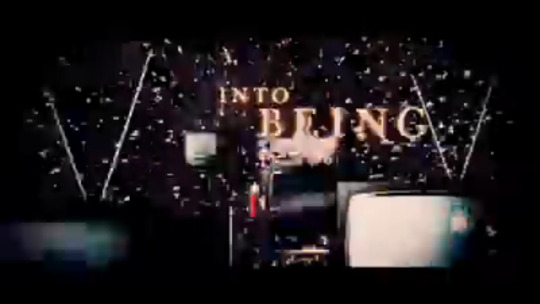
dear god my video quality is TERRIBLE
i.......... i might torrent this show and watch it offline
this is horrendous i can’t see a damn thing
i have never seen pixels this big
-
04:11
okay the quality calmed down after a minute
i loooove the intro, i love that it’s basically word for word from the book
i feel like i’d find it funnier if i hadn’t read the book 3 months ago
-
also? god is a woman? yes
-
04:13
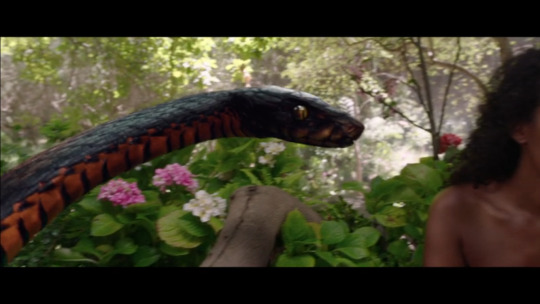
is it just me or does the snek have a slightly david tennant-esque quality about it
-
i’m so happy adam and eve are black
-
04:17
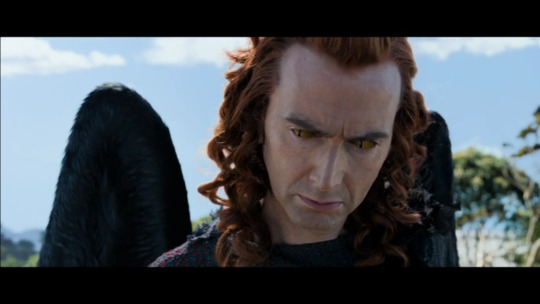
omfg. aziraphale said “ineffable” and now CRAWLEY’S CHECKING HIM OUT TRYING TO SEE IF HE HAS ANY JUNK
WOW
...or y’know, looking for a flaming sword. SAME FUCKING THING.
-
also i looove how FLUFFY azi is
-
azi: “do hope i didn’t do the wrong thing”
i fucking love them both uhrgughhhuhuhughuhhh
-
04:21
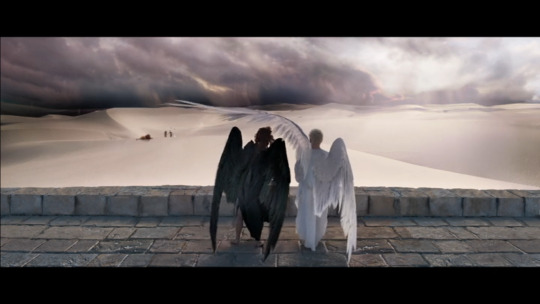
small sob for cuteness
umbella wings
-
04:23
in the opening titles, crowley just stopped a spaceship and aziraphale turned it into fish
i feel like that was a douglas adams reference and i’m on board
-
04:25
the entire time i read the book, up until i saw video promos of this show, i thought “crowley” was said the same way as spn’s “crowley”, as in “crahwlee”
not “crOhwlee”
i definitely like that they’re different though
both probably named after aleister crowley tbh. all of whom are queer.
-
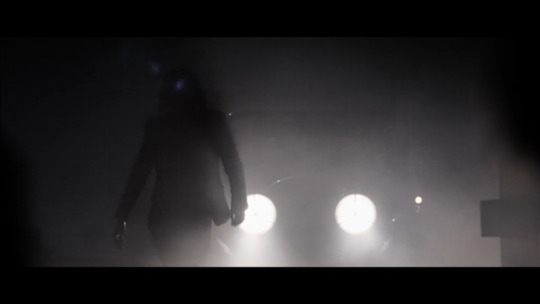
THOSE SWAYING HIPS
i haven’t found david tennant attractive in about 9 years but WHOOOP HELLO AGAIN
somehow attractive for entirely different reasons than before. like. my taste changed but tHEN
-
i’m on crowley’s side, taking down a cellphone network is VERY ANNOYING
-
04:35

crowley: shitshitshitshithsit
:D
i can’t wait for aziraphale’s big swear
-
04:37
i miss eating sushi
sushi was great
-
04:43
this baby delivery thing is sTRESSFUL
“aaaaurthurrrrr”
nooo
poor lady
-
04:45
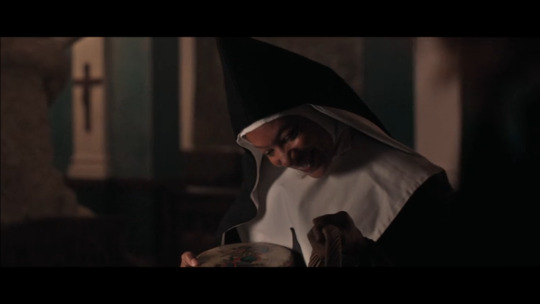
“little toesie woesies”
where’s the sister mary loquacious fan club and where do i sign up
-
i’m glad they colour-coded the babies and did the playing card explanation because this part of the book always tied my brain in knots
-
05:00
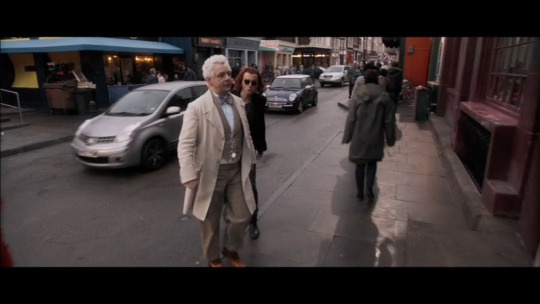
this is reminding me how utterly gross england is
-
“MY POINT IS............. DOLPHINS”
YES
-
05:06
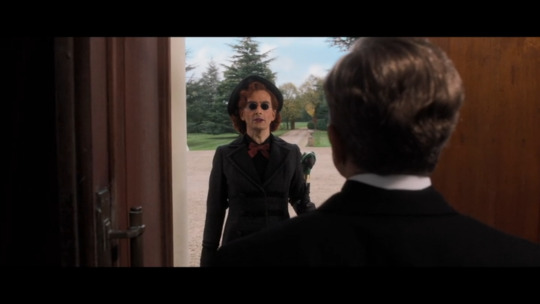
see in the book
i never once realised that the nanny was crowley in disguise
-
05:11
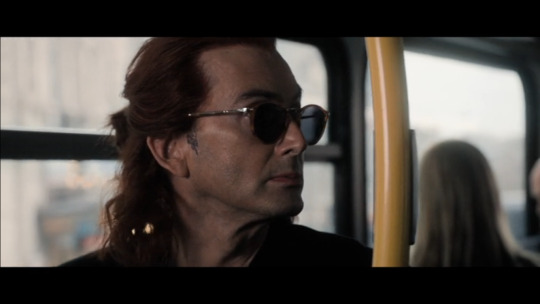
digging the snake tattoo sideburns
-
05:14
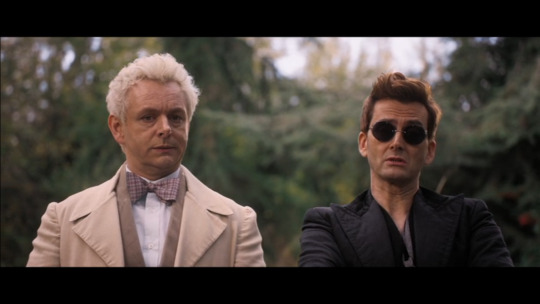
and yeah the short hair looks good
-
05:15
fINALLY crowley called azi “angel”
-
05:17
crowley: “oh no no don’t do your magic act, pleeease”
the magic act scene is one of my fave parts of the book <3
-
05:20
aw man they cut out the best part
i mean i get why
the kids shouted a bunch of gay slurs at aziraphale
and there were no secret service people with guns
but aw mannn
AND THEY CUT OUT THE BIT WITH THE DEAD DOVE AND CROWLEY BRINGS IT BACK TO LIFE FOR AZIRAPHALE
THAT WAS MY SINGLE FAVOURITE BIT OF THE BOOK
AND IT’S GONE
;C
-
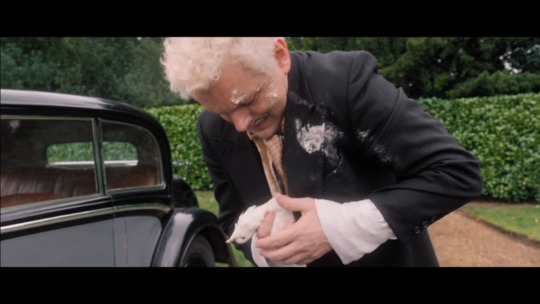
OH WAIT
THERE’S THE DOVE
OH GOOD
-
aw man aziraphhale just brought it back himself
i liked it better in the book
they sat on the steps outside and crowley comforted azi and took the dove and fixed it for him, and then it flew off
idk i just had such a perfect image of that moment in my mind and this was..... good but not the same at all
could be gayer
-
05:27
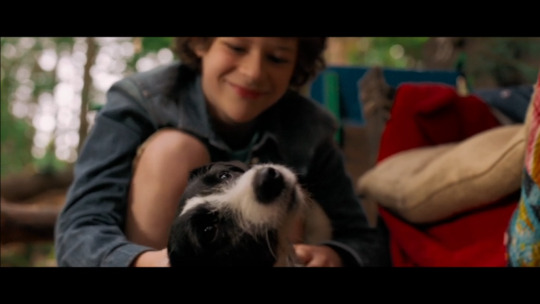
good dog
-
05:28
crowley: *snifsnif* something’s changed
aziraphale: “oh it’s a new cologne, my barber suggeste--”
crowley: “no no i know what you smell like”
gayyyyyyyyyy <3
-
05:31
okay that’s ep 1 watched!!! i’ll watch more maybe later tonight :D
ENJOYING THIS SO FAR
not as gay as expected ........YET
needs 400% more “angel” and “dear”
--
EPISODE 2: The Book
07:42pm
pillar of salt guy: “something smells evil”
the fact crowley smells evil and yet aziraphale likes his company regardless says a lot
-
07:49
fully expected crowley to say “i didn’t fall, i sauntered vaguely downwards”
-
07:50
iiiii’m finding the narrator a little annoying
maybe it’s because i read the book so i know what’s going on
but saying “he has four items to deliver in his van. he works for this postage company and he’s making his first delivery in a formal warzone”.... idk i feel like all of those things could be shown visually? saying it rather than showing it probably saved seven seconds of airtime, but damn
-
07:56
i wonder if the narrator was a later addition to this, for new audience clarity? the script for god just seems a little stilted, idk
edit: i kind of got used to it, but it was still jarring, which i’m sure was the opposite of the intended effect
-
08:09
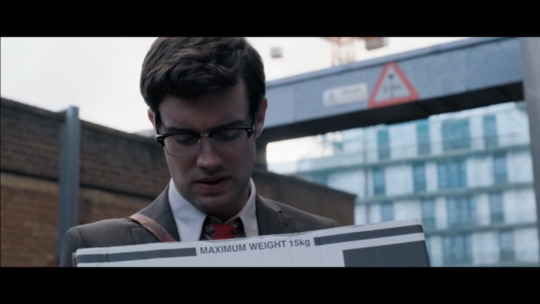
the saddest newt
-
08:13
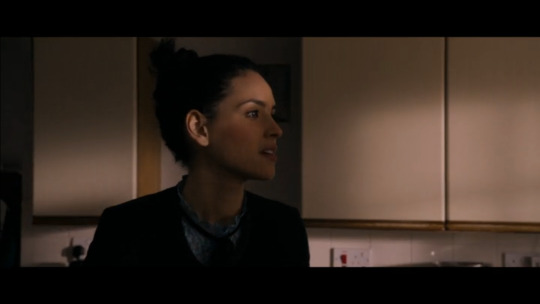
she’s kind of exactly how i imagined her in the book
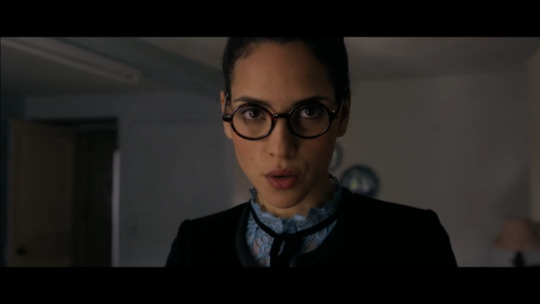
and definitely my fave next to aziraphale and crowley
-
08:17
i feel so bad for crowley’s plants
poor babies
-
08:19
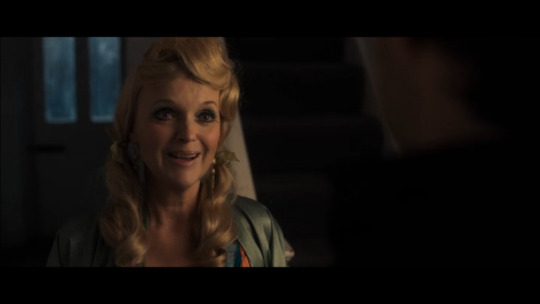
for some reason i imagined her as a redhead. kind of more like mrs weasley
-
08:33
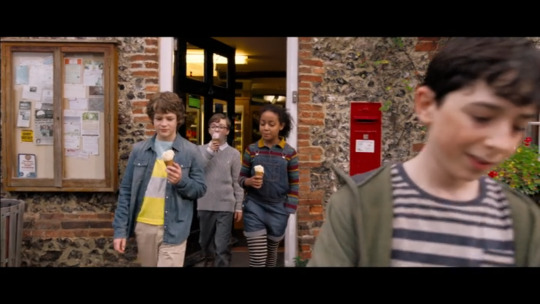
these wee children......... so soft.......... so smol
-
08:25
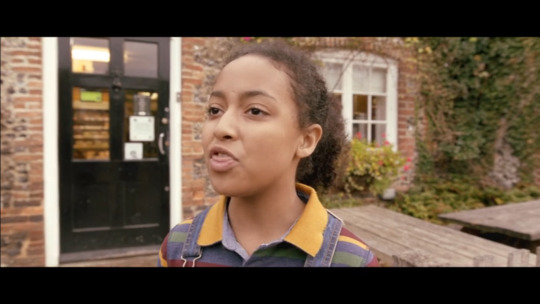
v happy with the casting for pepper
tiny downside is that we lose another redhead
-
08:29
i find the kids’ conversations hilarious because they’re the same age as harry potter when he goes to hogwarts the first time
idk if this is what eleven year olds are like in real life, but when i read the book i did feel distinctly like they spoke like eight year olds
-
08:35
crowley: “i like spooky. big spooky fan, me”
he just sounds like the tenth doctor
-
08:36
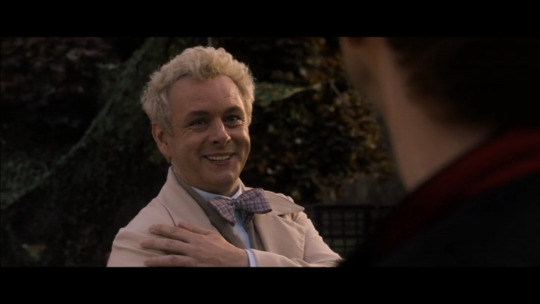
YEEE FINALLY CROWLeY DOING NICE THINGS FOR AZIRAPHALE
-
08:48
"you know, crowley, i’ve always said that deep down you really are a--”
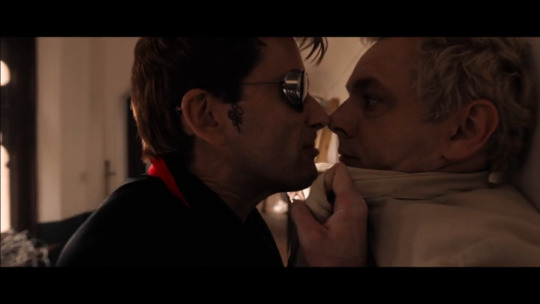
“SHUT IT”
DON’T YOU CALL HIM NICE YOU PRETTY BASTARD
-
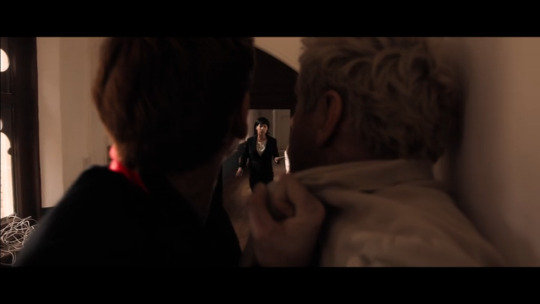
loquacious: “sorry to break up an intimate moment”
-
08:45
i imagined anathema’s tripod thing to be about 5 feet tall, not a cute little knee-high thing
-
08:48
freddie mercury: BIIIII CYCLE
BIIIIIIII CYCLE
yeah i was waiting for that
-
crowley: “get in, angel”
HE MURMURED
DON’T MURMUR YOUR TERMS OF ENDEARMENT noo
-
09:00
end of episode 2!!! i freaking loved aziraphale vs the book <3
-
the credits for this ep credit konnie huq as someone named pam but idk who that is? i had a crush on konnie huq as a kid when she was a presenter on “blue peter”
OH WAIT RIGHT the lady on the breakfast show on crowley’s tv. aw such a small part. hoping we’ll see her again later
edit: nope. might rewatch that part to pay more attention. obviously i didn’t even recognise her after like.. 15 years
--
EPISODE 3: Hard Times
09:05pm
brb gotta get some food
-
09:14
and now i wait for food
EPISODE THREE LET’S GO
is this the one that’s just crowley and azi’s backstory?
-
09:16
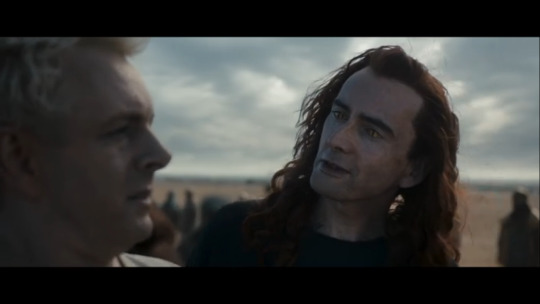
i can’t even put my finger on why but he’s getting more attractive
-
09:21
ah yes
aziraphale is eating shellfish and trying to tempt crowley
“oh... that’s your job”
i love this part of their dynamic
-
09:29
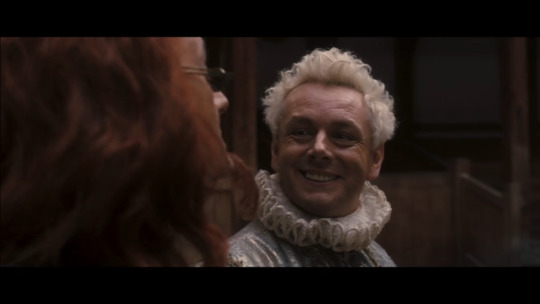
i adore when crowley makes aziraphale smile <3
-
09:43
SAUNTERED VAGUELY DOWNWARDS
YEE
-
i like seeing how crowley’s sunglasses differ throughout history
-
09:36
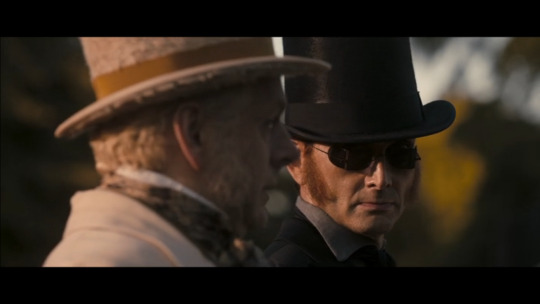
“if they knew i’d been... fraternising”
this is such a forbidden romance i love ittttt
-
09:49
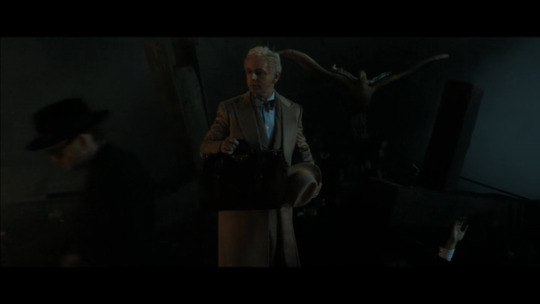
CROWLEY SAVED THE BOOKS
and SOFT VIOLIN PLAYS
THIS IS A FUCKING LOVE STORY
k this is my favourite part of the show so far <3
-
09:50
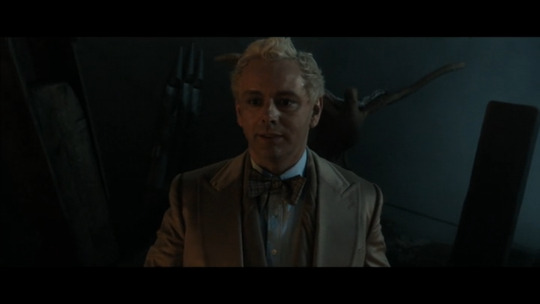
this angel just fell in love
right in that moment
i see cartoon hearts around him
-
09:54
just had to pause for a second bc there was some broccoli in my tea :c
-
09:56
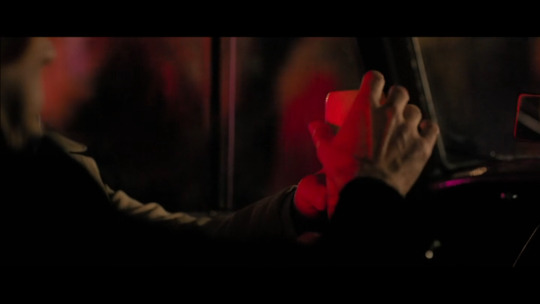
awwwwwwwwwwwwww
he got him holy waterrrrrrr
-
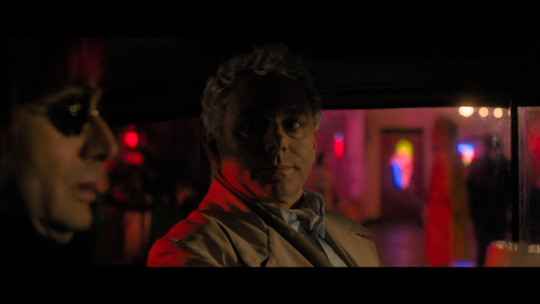
UNIVERSAL ANGLE OF HETEROSEXUAL LONGING
-
definitely feeling a lot of “NOW KISS” right about now
-
09:59
LAUGHING BECAUSE THE OPENING CREDITS ARE LITERALLY HALFWAY INTO THE EPISODE
-
10:03
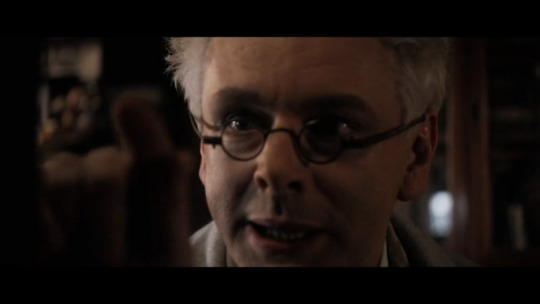
throughout the entire book azi just came across as the kind of person who wore glasses even though glasses were never once mentioned
I AM GLAD TO SEE GLASSES
-
10:12
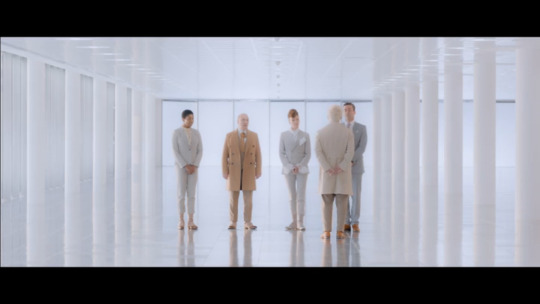
i like this colour palette and the gold in their makeup
-
10:27
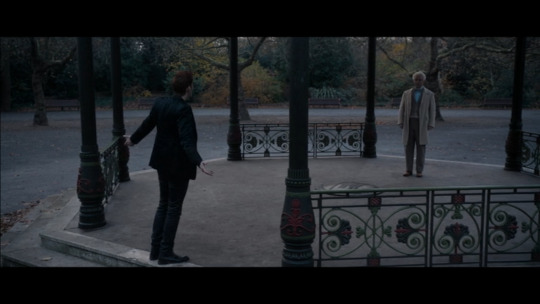
“we can go off together”
omg the world’s ending and crowley’s all RUN AWAY WITH MEEE
-
10:31
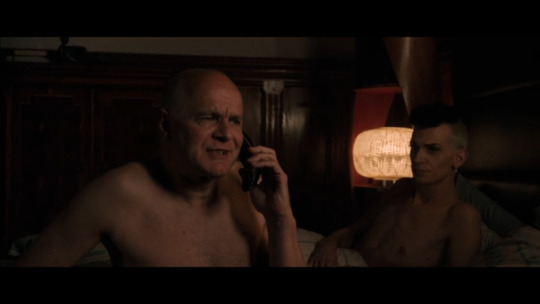
okay then
good eyelashes
edit: i also like how their relationship was explained with a simple tap on the wrist: hurry up, you’re on the clock, i’m a sex worker, finish your call because i’m leaving
-
10:32
episode three DONE
these eps don’t feel long enough
maybe that means the pacing is just right? who knows
i feel like i should be doing something other than watching this but..... why
--
EPISODE 4: Saturday Morning Funtime
10:48pm
aziraphale is SOFT and he’s perfect like that <3
fuck u gabriel and your body shaming
-
10:53
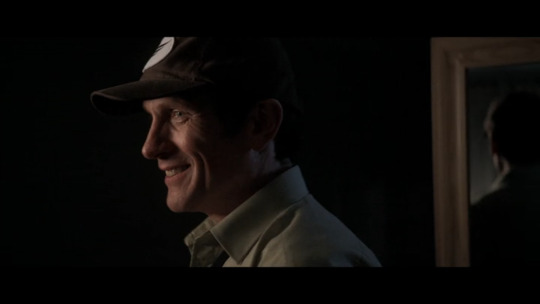
i want delivery guy to be okay BUT I READ THE BOOK
so............... i know he will be...... eventually
-
10:55
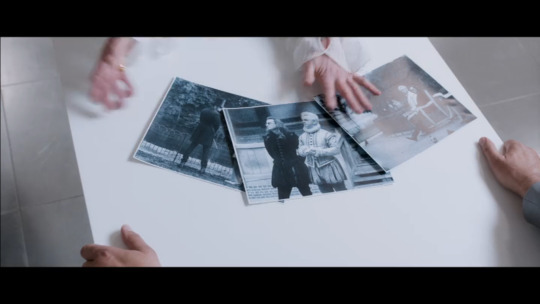
how did they get photographs taken in the 1600s
-
oh gabriel’s eyes ARE purple, i thought i was seeing them wrong
-
11:02
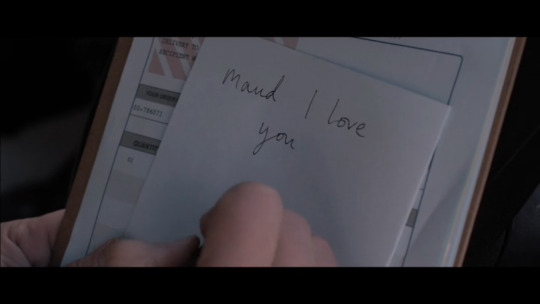
“maud i love you”
noo ho hoooo
-
11:09
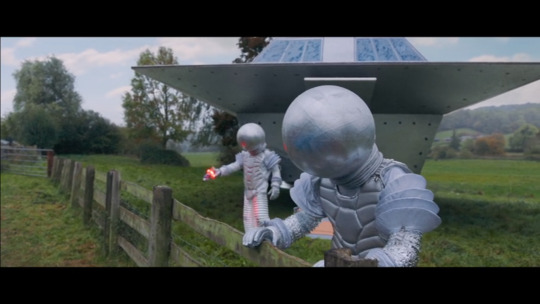
a little douglas adams, definitely
BUT NO PEPPER POT DALEK
AWW
-
11:10
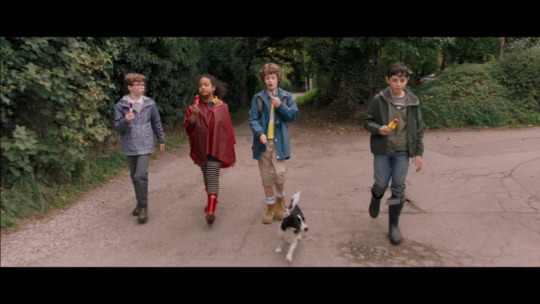
the season is very much jumping between summer and autumn
though i suppose that’s the point, tadfield is just perfect
-
11:12
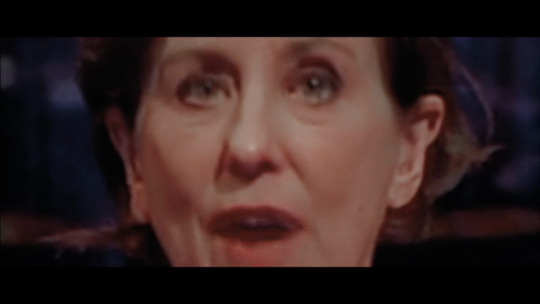
“which the internet has begun to refer to as the kracken”
i wonder if good omens inadvertently inspired me to write The Wireless a couple of years back. wouldn’t be surprising
edit: no, couldn’t have, because the internet wasn’t much of a thing (or a thing at all?) in the book, given its publish date
-
11:20
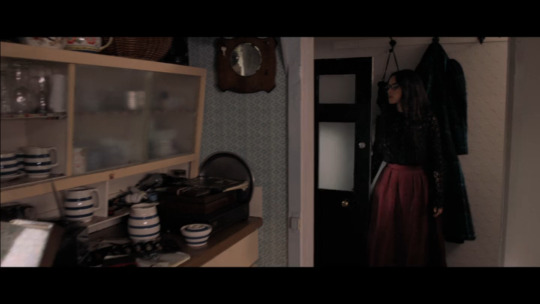
that’s a v nice dress/top combo
gosh she’s so pretty
-
11:30
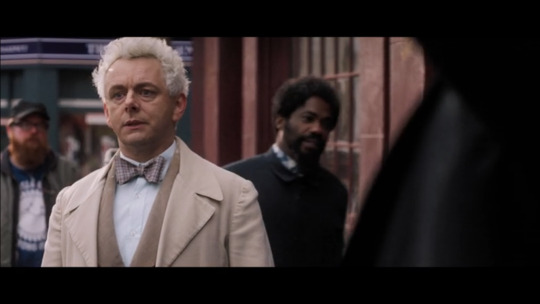
crowley: “we can run away together!!! alpha centauri!!!”
aw baby
-
crowley: “i’m going home, angel! i’m getting my stuff, and i am leaving. and when i am up in the stars, i won’t even think about you!!”
THAT WAS A V SAD BREAKUP NOOOOO
why has there not been a single “dear” yet :c
-
11:37

oh no, this part
i loved this in the book but i am NOT READY for maggots
damn you gaiman
-
11:39
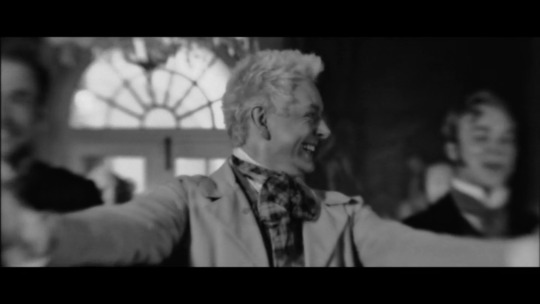
he’s so cute
and so gay
-
11:42
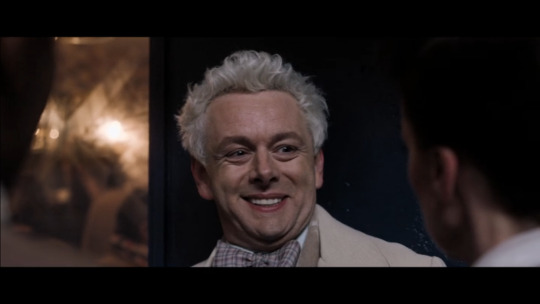
uriel: “don’t think your boyfriend in the dark glasses will get you special treatment in hell”
he looks kinda delighted uriel called crowley his boyfriend
i would say he looks worried but this shot was used without context in the trailer and it came across as genuine joy, i actually thought he was looking at crowley
-
11:46
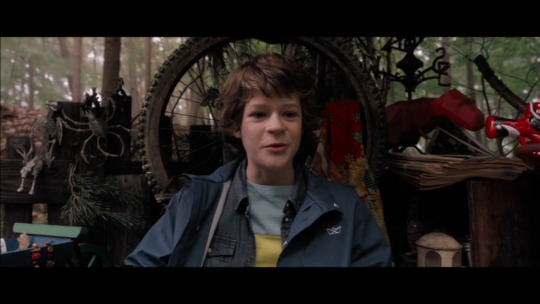
i thought it was a strange throne before
a spider at the centre of a web
dark halo
yeah
-
11:51
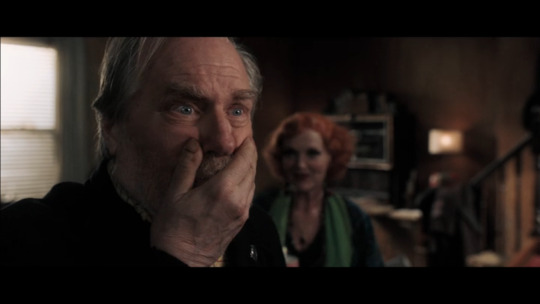
oh now she’s a redhead???
-
also i’m glad they implied newt and anathema just kissed because the sex thing was weird in the book
-
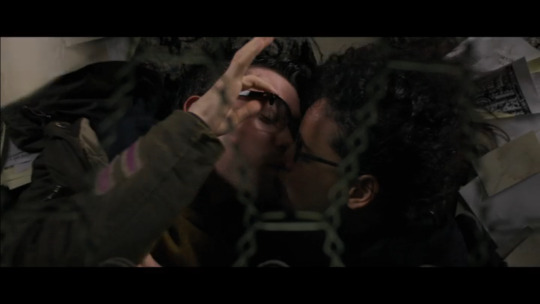
okay never mind
hmm
-
12:05
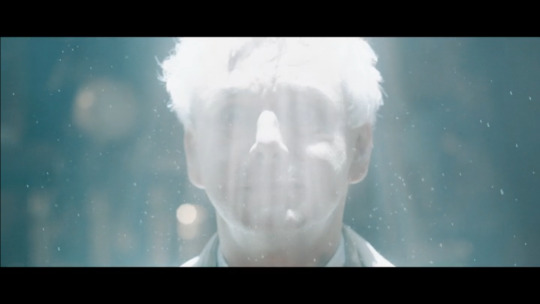
aziraphale: “oh.................ffffUCK.”
YEEEEEEEEEEEEEEEEEEEEEAH
-
12:07
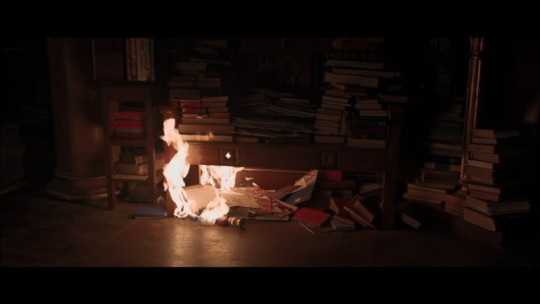
oh no
it’s happening
oh no
i hate this part but i love what happens because of it
-
12:29am
i have eaten and now i have tea and i am back from MORE BOOKSHOP FIRE
-
EPISODE 5: The Doomsday Option
12:31
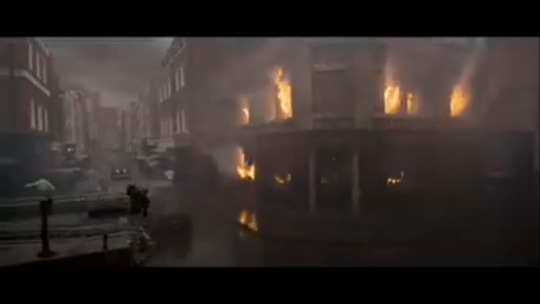
nuuuuuuuuuu
and “you’re my best friend” playing while crowley’s tryna call azi
nuuuuuu
-
“somebody killed my best friend”
jfhsdfjsdj
/sobs
-
12:36
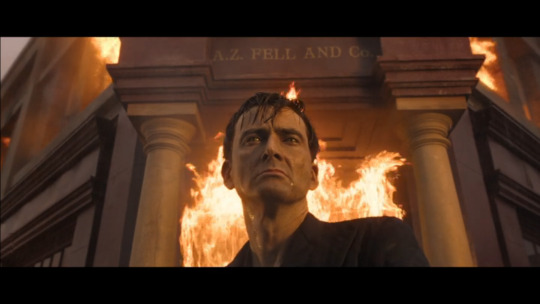
freddie mercury: “somebody find me somebody tooo ooo looove”
edit: the narration WRECKED this. it was so dramatic and visually emotional but the voiceover completely screwed with it and it was SO UNNECESSARY.
-
12:46
crowley: “i lost my best friend”
he says, while crying, while talking to that friend
-
THE ONE BOOK HE WANTS IS THE ONE CROWLEY SAVED
THEY’RE SO FUCKING BEAUTIFUL TOGETHER
-
azi wanted to share crowley’s body
and then said they had to get a wiggle on
-
12:52
they cut out the hell’s angels / lesser horsemen
i figured they would, but still a shame
-
1:54
in the book tracy’s “spirit guide” was native american but daaaaaamn that part really needed to go
now she’s irish which is... better, probably
-
01:01
ron: “SHUT. UUUUUUUUUUUUUUUUUUUUUUUUUUP”
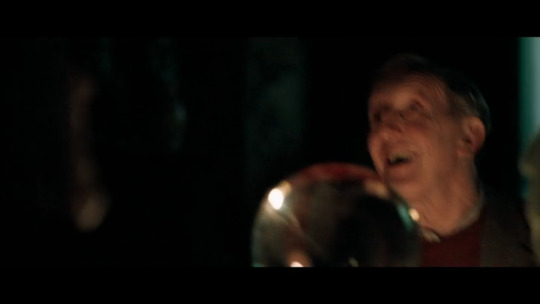
this guy’s having the time of his life
-
01:03
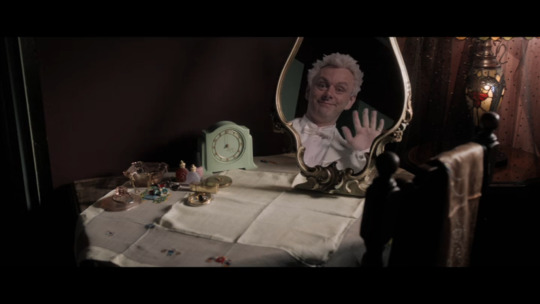
he wave
-
01:05
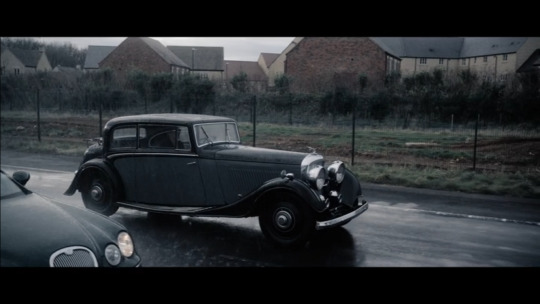
1926 bentley; sexiest car right next to the ‘67 chevy impala
-
01:08
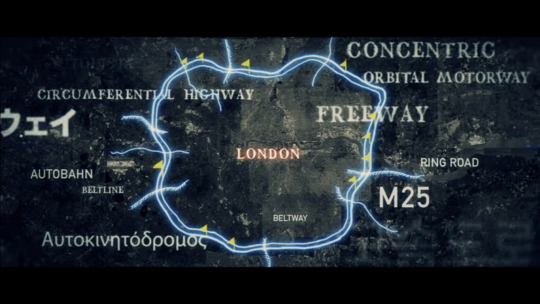
omg gotta translate and explain the road
-
01:13
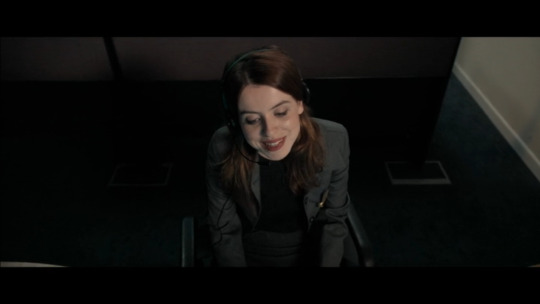
OH NO the maggots are about to happen
they changed the placement of this but it worked for the pacing
-
OH NO
-
k well the maggots were gross but not as bad as i imagined
-
01:31
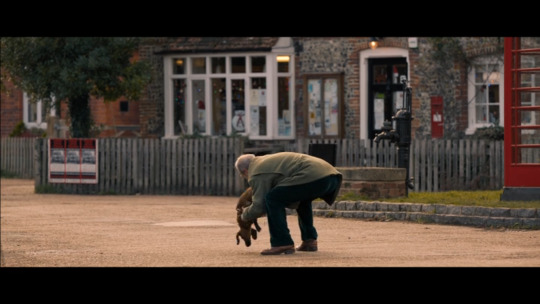
omg the dog turned upside down rather than be picked up
i wonder if that was intentional
dog: I DO NOT WANT UP
-
01:34
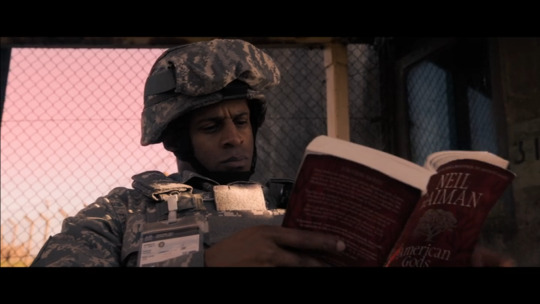
pfff he’s reading “american gods” by neil gaiman
-
01:44am
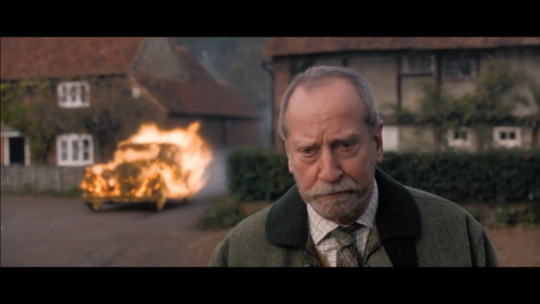
10/10 flaming car
-
EPISODE 6: The Very Last Day of the Rest of Their Lives
01:51am
here we go...
-
01:55
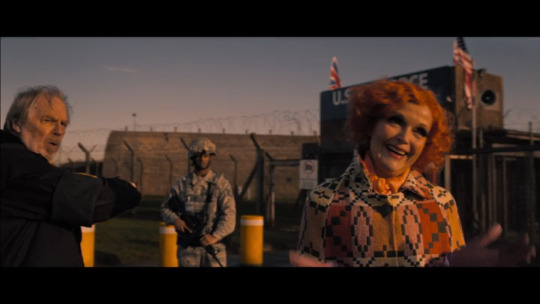
azi so happy that crowley said the dress suits him <3
-
01:57

rip bentley
-
01:59
aziraphale: “we are here to lick some serious butt!!”
crowley: “kick!! kick, aziraphale, for heaven’s sake”
-
02:06
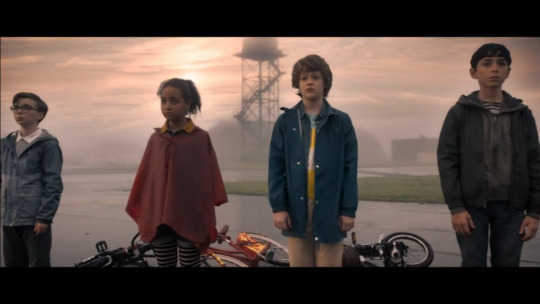
i freaking love the parallel between the Them and the horsemen in the book
and i love that they did face shots to show the parallel
pepper = war
wensleydale = famine
brian = pollution
adam = death
the parallel is less clear for brian and wensleydale, at least in the show. was more obvious in the book. but at the same time i kind of got confused between them a lot, brian was always eating, but wensleydale was named after cheese
-
02:14
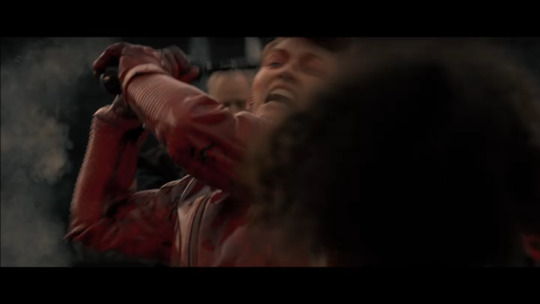
pepper: “i do not endorse everyday sexism”
/STOMPS ON WAR’S FOOT
YEAAAAAAAAAAAAAAAAH
-
02:25
shadwell: “anyone who wants ta get ta the hoore of babylon will have to get past me”
earlier anathema said “boyfriend”
may i point out that all the adults are paired up
shadwell & madame tracy
newt & anathema
......and....
aziraphale and crowley
-
0:28
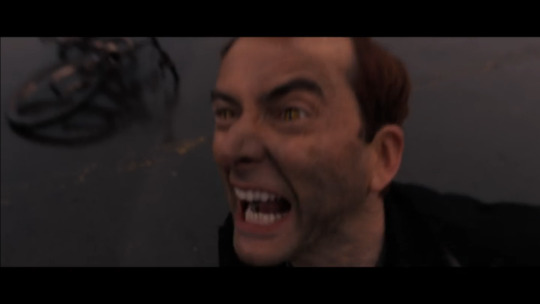
crowley: “we are FUCKED”
these two need a holiday
-
azi: “come up with something... or.... or i’ll never talk to you again”
he knows crowley loves him aww
perfect blackmail material
-
02:32
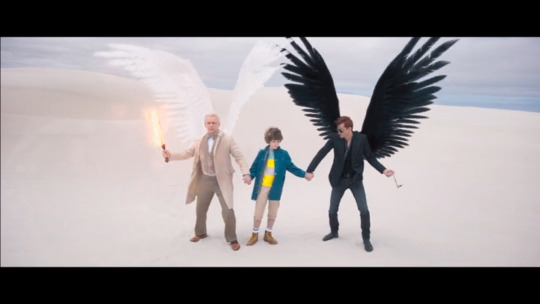
they went from trying to kill him to being his gay angel parents real quick
-
02:35
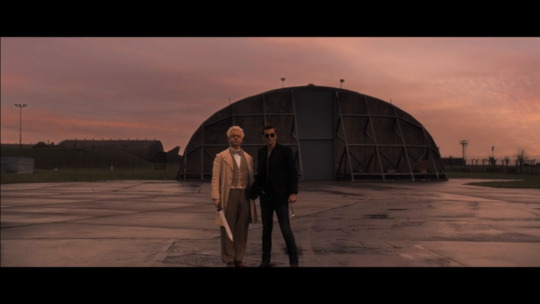
thought they were holding hands for a second there
edit: regardless, a whole damn airfield and they’re 2cm apart
-
02:39
happy ending for the postman, hooray~
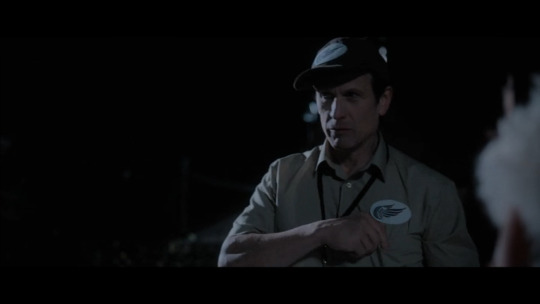
-
crowley about the bookshop, softly: “it burned down. remember? you can stay at my place”
awwWWWWWWWWWWWWWWWWWW
-
02:42
CROWLEY GOT HIS CAR BACK AND YET HE TOOK A TAXI
-
02:45
anathema: “why is your car called dick turpin?”
newt: “dick turpin is a famous highwayman. it’s called dick turpin because everywhere it goes, it holds up traffic”
i laughed
this wasn’t in the book and i always wondered
-
02:51
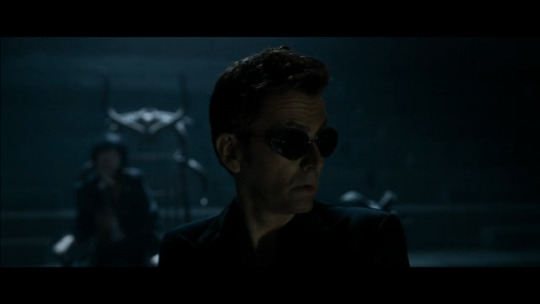
i wonder if holy water wouldn’t burn him because he’s too good
-
03:00
gabriel: “don’t talk to me about the greater good, sunshine, i’m the angel fucking gabriel”
really enjoying these swears
-
03:03

i thought so
-
03:30am
paused for a bit to get ready for bed
i thought it was after 4am but nope
-
“there would be other summers, but not one like this. not ever again”
that genuinely makes me emotional
i think that’s why it’s my favourite book, i can relive that summer with them
-
03:35
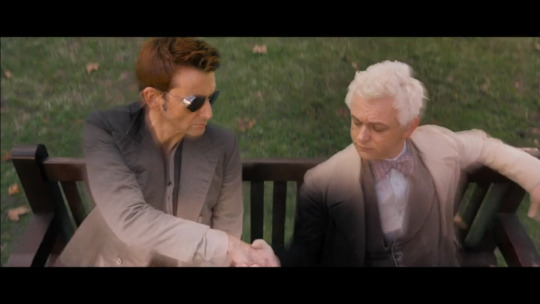
omg
-
OH MY GOD
WAIT
THEY
OH MY GOD
THEY WEREN’T IMMUNE, THEY JUST SWAPPED PLACES
HOLY SHIT
edit: THIS WAS NOT IN THE BOOK AND IT’S BRILLIANT AND I’M GLAD IT’S HERE
-
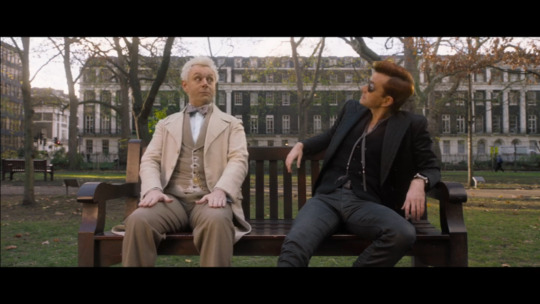
crowley: “let me tempt you to a spot of lunch?
azi: “~temptation accomplished~!”
THEY’RE SO STINKING CUTE
-
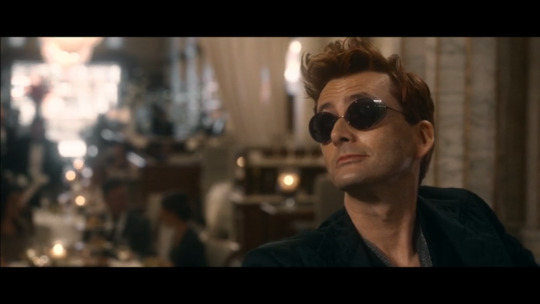
“just enough of a bastard to be worth knowing”
perfect
STILL NO USE OF “DEAR” THOUGH AND IT’S KILLING ME
-
that ending with the bird made me teary-eyed
-
credits: BENEDICT CUMBERBATCH AS SATAN
WOW
OKAY
AKSFJDSF /snorts
-
the end credits and the song i just wanna bawl my eyes out
i loved this so much and i’m so glad it was GOOD
i loved that they added so many people of colour. in the book i imagined crowley played by alexander siddig (star trek: deep space 9 era) but i guess david tennant makes a pretty good crowley too
i’m trying not to be upset that my favourite scene with the dove and aziraphale’s affectionate use of “dear” was taken out
but
this was damn good regardless. even gayer in places than in the book
-
this nightingale song is my new favourite song
i never got the reference before
“and as we kissed and said goodnight, an nightingale sang in berkeley square:
GAY
SO GAY
i love
-
the end of the credits “For Terry”
ACTUAL OUT LOUD SOBBING
TERRY YOU WOULD’VE LOVED THIS
NEIL DID YOU PROUD
-
oh this was so beautiful
i’m gonna watch it again with my family probably within the week. i’m so emotionally tender now
azIRAPHALE WAS SO FLUFFY AND CROWLEY WAS SO NICE ABOUT THE BOOKS
ugh i love them more than ever
anathema...... i don’t know if i relate to her, want to be her, look up to her, want her to mentor me, live with her, or find her attractive. maybe all of the above. but she was freaking PERFECT. PE R F E CT
the casting was so... just right. thank you casting people for anathema.
like... i also didn’t mind the newt/anathema thing so much now. it was hard to tell in the book how much of a relationship they had after, but that smile she gave while lying in bed the morning after, that worked, it said a lot. and i like that it was her choice to burn the prophecy sequel rather than newt’s suggestion
gabriel was amusing. like.. i’m glad he wasn’t in the book. but he was great here. also really like michael and uriel. uriel was so damn beautiful.
i also would really have liked to see a mention of the fact crowley and aziraphale are both agender and potentially asexual. not even a hint of it here. buuuuuut it guess i know from the book. so.
my favourite episode was of course episode 3 with crowley and aziraphale’s 6000 year backstory. especially the 1940s bit where crowley saved the books <3
this show was was less confusing than the book too. ugh it was done so well
OH
we didn’t see where the soldier guy went when aziraphale zapped him away!!! in the book he reappeared safely back home and went out to see his family. to be fair i don’t know whether he died and went to heaven, but it was a nice thing to happen
and they took out the Them’s bully/rival gang, who was led by the third baby from the baby swap, and who won awards for his tropical fish. at least that’s what i remember. which meant the parallel about heaven/hell being rival gangs was lost here. but the parallel between the horsemen and the them was stronger than ever and i loved that.
look, i mean, 10 out of 10, EASY.
favourite thing? yes. yes, absolutely.
--
shoutout to the one time i wrote a Good Omens/Destiel crossover fic The Angel Cake Challenge
IT’S 04:02am THIS TOOK ME 12 HOURS
04:40am AND FORTY MINUTES TO EDIT
congrats if you made it to the end of this!!! thank you for reading <3 AND GO WATCH THE SHOW IF YOU HAVEN’T ALREADY
#Good Omens#Good Omens spoilers#Elmie watches things#post of postiness#Crowley x Aziraphale#long post#mobile users...... i am so... SO sorry#i hope you can scroll fast#The Angel Cake Challenge
54 notes
·
View notes
Text
21st of February, 2020
"The One with the Soft Epilogue"
Another day, another flannel, another attempt to write this bloody post as Tumblr hates me.
It's morning in the teachers' lounge and I'm standing in the inner side of the doorway holding some props, rather anxious about a guest who never actually turned up to see us rehearse. Just before I go outside, V walks into the room, and we lock eyes. I feel a little calmer.
Third period, and the door slams shut. V isn't in a good mood. And once she slaps the stack of test papers on her desk, neither are we. I try to do my best with two-week-old memories of notes once written and big, fancy words to make it look like I know what I'm doing. She's grading some of them immediately while the rest of the class is finishing up, the cap of her marker hanging from her mouth, and I get a smaller heart attack when I see her pick mine up. Ticks, with swift and certain movements. She leans closer to read something. Tick. Then she underlines something. And another thing. Fuck. I make a sound of nervousness. "What, am I grading too fast?" she asks me, not even looking up from the next paper. My politeness doesn't allow me to answer that, so I rather just stay silent and mull it over.
Rest of class is pretty normal, nothing groundbreaking... except for this one thing. Brunet Boy in the Back tells her and us this story avout how he saw his friend get into a fight in a club. I don't even remember how it came up. Then V, as she has told us before, says that she doesn't want to know about her students' personal lives, because it's none of her business... then she adds something new to the usual monologue. She tells us that the only time she wants to know is if someone steps heavily out of their comfort zone and does something stupid or something that paints them in a bad light. She ended it with something along the lines of "Alcohol isn't what can cause the biggest damage." See? This is why I'm grateful every single day that I know her. I have never heard anyone speak like this before.
We have a P.E. teacher as a sub in one of our later classes. V comes in as soon as class is over, carrying a great big stack of about 15-ish, kinda thin books. "You guys had P.E.?" she asks us jokingly. She sets the books down on the teacher's desk. "Can these stay [here]?" she asks. We say sure, and she's gone.
That very same break, about half a minute later, me and my friend are walking to class in the other wing, and V is right behind us. Halfway through, but entirely consciously — just to impress her —, I switch to English, and we carry on talking like that. Later, we have a laugh about how she always shows up whenever we do weird shit. Always, without mistake.
You know the one, very stark difference between V and I? How we read. See, when I'm asked to read in classes, me being me, I perform. I add flourishes and emotion to it to make things more interesting — mostly for myself. V just reads it as it is. She reads well, but I imagine it's a fair bit boring for most people. I'm fine with it, because I like her voice. That, paired with the Gogol novel we were reading, was perfectly fitting for a sleepy Friday afternoon. The only intense part was her throwing the classroom door open, to send the three laughing girls, who wouldn't let her speak, to the vice principal. Her "Now, that I can finally teach..." afterwards had us all laughing as well.
The bell rings, and we wind up as a team. I'm collecting all the books, she's cleaning the board. By the time I'm finished, she's outside, talking to someone I can't see. I head out, the books in two smaller stacks in my hands and... uh-oh. She's with the aforementioned vice principal, and I'm immediately concerned. Whenever that man shows up, something bad happens. I watch her reactions, but nothing indicates bad news. When I got home is when I realised that he probably wanted to talk to her about the girls.
We get going soon after, and this senior boy joins us, who needs to talk to V. By the time it's just the two of us, we're at the the other wing. I look towards the library, not understanding why V is going somewhere else, when she tells me: "The library is closed by now, let's go upstairs. I'll take that," and takes one of my stacks. The door isn't big enough for both of us to fit, so I let her pass first. "Come," she calls out to me softly when she notices I stopped. "It's that falling-off-y amount," she refers to the books as we head towards the lounge. "[It's] not that bad." There's a small beat of silence before she says "Yeah." The sass in just that one word spoke volumes. The way I understood it, it was like she wanted to say: Kid. Don't be so polite with me. You don't need to.
When we walk inside, there's only one teacher there beside the two of us, and he looks at me with big ole confused eyes. He probably didn't expect to see me there. I walk on over to V's desk and set the books down. "Well, thanks very much." she tells me. I no longer remember if I said you're welcome, but there's something else I did say. "Have a good weekend, Miss," I tell her, as I do every Friday as of late. She doesn't look up at me, she organising her stuff about, but she tells me "You, too. Bye." 1.5 years I've known her, but I swear to God I have never heard her speak so soft and quiet before. There was something so gentle, so utterly comforting and warm about it that I nearly cried. Again. Meanwhile, to the other teacher, I just say "You, too, Sir!" assuming he heard me, and he gives me a much more formal goodbye. Him and V are only a year apart and I've known him for three times as long, yet we're incredibly formal. Funny little thing, life is.
We started and ended the day in the same place, both occasions ending with me leaving. Our alpha and omega. Huh. I need to stop analysing my life like it was a poem full of metaphors, don't I?
~ S ♡
[Every story I share here, no matter how specific I get with my wording, depicts actual events from my own life.]
2 notes
·
View notes
Text
fuckoff long post about my skeksis language thoughts below the cut. i ought to do more with this but it’s been sitting in my files for a couple months now and i want to Show People
-i've talked about this hc on here before, but i like it enough to repeat. the existence of names like skekmal and skekvar indicate that they have some means of producing labial consonants with a beak (presumably the skeksis can pronounce their own names. also, while i am very fond of assuming the same "this is translated from what they're actually saying" conceit tolkien uses applies to tdc, it seems unnecessary and overly complicated to assume anything of the sort about *character names,* especially ones that don't sound like real-world names to start with. i am going to assume unless told otherwise that those are their actual in-universe names and not "translated" for human benefit). my favored solution is that they have syrinxes like a parrot’s rather than humanoid vocal apparatus.
-there are separate extant skeksis and gelfling languages. (evidence for this: the skeksis were straight up originally supposed to speak their own language in the movie. "shadows of the dark crystal" has a comment about how well skekso speaks gelfling. also, "shadows of the dark crystal" does some things with speech patterns for the skeksis, which i will get into below and which, with the possible exception of chamberlain and novels!hunter, make most sense to me to treat as second language difficulties--i have a hard time seeing, say, emperor deliberately speaking ""wrongly"")
one might expect that the skeksis, being the way they are, would install their own language as the official or state language. given that "shadows of the dark crystal" specifies that skekso's accent in the Gelfling language is pretty good, in a scene taking place in the castle ("his voice sounded almost cultured, his accent in the gelfling tongue much more perfected than the stilted broken phrases of the Chamberlain" (*shadows of the dark crystal* 202)), i'm assuming that *isn't* the situation, and for whatever reason they're using Gelfling for state business. given the skeksis in general, that sure isn't out of a sense of benevolence.
one option: the skeksis treat their language as a Special In-Group Thing that they don't want to use with or maybe teach to outsiders. it's become essentially a ritual thing (which might in itself warrant an explanation as to how that came about, tbh), or they do use it for casual purposes but only among themselves, something like that.
another option: there's some specific reason the skeksis lang would be impractical as a state language--i think the most likely thing for this is that there's some aspect(s) of the skeksis lang that are just anatomically difficult or impossible for gelflings to produce, perceive, or both (my initial thought was just "they might have sounds a gelfling doesn't have the right anatomy to make," influenced by the syrinx idea, but tbh going with that same idea i think like, crows, have fairly nuanced signals that we might just hear as "caw" across the board, so a species with both that sort of vocal anatomy and their own language could conceivably have nuances of sound difference a different species wouldn't Pick Up On, either?)
and these aren’t necessarily mutually exclusive, either
-name vs title: (this is as much my friend skye's (@deerpunk) idea as mine, so i don't want to take full credit for it) using a skeksis's personal name vs their title is a formality distinction pretty similar to the T-V distinction, except that, due to the skeksis being How They Are, the more positive familiarity/intimacy sense has been lost in most contexts, for most skeksis, and most of what's left is the insult sense. (there are some exceptions to this: skekvar to skeksil, when he's decided he trusts him, maybe skeklach and skekok (although that strikes me as half-jokingly rude friendship, so it could be both tbh), skekmal's death--and that could be a breaking down of formality expectations because the situation is so dire.) because strength, respect, ornamentation, dignity are so important to the skeksis, using someone's title to refer to them is the default, and using a personal name is specifically marking something. this is also why we very rarely see anyone call emperor "skekso" (with the exception of, to the point i’ve gotten to in the novels at the time of writing, skeksa and skekmal--and those two seem more likely to talk back to skekso anyway tbh)--it would just be rude as hell and there might be consequences
it's also of immense interest to me that at one point in "shadows of the dark crystal," skekmal refers to emperor as "so." i have not seen this kind of shortening anywhere else. it's either a peculiarity of skekmal, which would check out, given how weird his speech patterns generally are in that book, or an additional level of informality, which presumably no one but skekmal has the guts to *use* (especially for skekso holy shit).
-"shadow of the dark crystal" gives several skeksis specific fucky speech patterns (presumably in the gelfling language), *besides* what's going on with chamberlain, which i think can mostly be attributed to like. Chamberlain. chamberlain has multiple scenes in AOR where there are only other skeksis present (so i think it’s a fair guess that they’d be using the Skeksis language), and his speech patterns are just as weird, in the same ways, as when he’s talking to gelfling.
so what i'm saying about this is mostly discounting chamberlain, although i will say that the “using the same weird speech patterns in sentences that are in-universe presumably in skeksis and gelfling” thing, to me, suggests maybe that he actually has a different kind of fucked up speech pattern across languages, and it’s being “translated” as the same for the benefit of the viewers (i would guess the skeksis and gelfling languages don’t have exactly the same grammar; i would also guess that chamberlain talking kind of weird is, as iirc the wiki suggests, a deliberate choice meant to project a certain image). it’s also interesting that from the very little information i have just from “shadows of the dark crystal,” chamberlain does not make the same errors as emperor (possibly he actually speaks gelfling fairly well and is playing up “oh look at poor harmless chamberlain, i don’t speak your language too good, be nice to me :)” ?)
i'm going to talk about *shadows of the dark crystal*!skekmal separately, since his speech patterns, as mentioned above, are kind of wild and have some commonalities with both chamberlain and the other skeksis in the book. i feel it necessary to distinguish novels skekmal from aor skekmal, who talks normally if a bit melodramatically. (also i'm getting the impression they have slightly different personalities, from what i've seen so far, but that's not relevant to this monstrosity of a post)
i am going to list the weird sentences individually in a bit here. the most notable oddities (discounting chamberlain and hunter) are copula omission, verb number agreement (possibly person, too, but english has so little verb agreement that that's hard to judge); "gelfling" being pluralized as "gelfling," which i think is common enough in tdc but in combination with the previous point made me wonder about pluralization errors? the omission of definite articles, and some odd word order stuff that could also be taken as sheer pretentiousness
copula omission:
"gelfling the ones that do the fixing" (202)
"gelfling causing problems for us, lord skeksis (202) ("lord skeksis" there also feels odd to me; i think i would have expected a definite article, and maybe a different word order)
"all gelfling traitors" (211)
verb agreement:
"we love gelfling, we do, we loves them" (203)
"after all skeksis does for you! gelfling came here just to tell such lies!" (211)
misc:
“daughter-soldier” (202) is not egregious but a bit odd
“yes?” to end a wh-question (202)
"silverling is sounding like a traitor herself" (212)
"see the crystal herself" (214) is not terrible but feels a Little weird
“we care not”
hunter: (not sure whether to even count this for Skeksis Speech Oddities because his speech patterns are SO wild)
"skeksis tower"
also drops first person subject pronoun (222)
"end this now, skekMal will do" (222) -- third person for himself, weird word order
omission of third person subject pronoun also
consistent omission of articles, except "skekTek the Scientist"
"not if skekMal make and take it for *himself*" - verbal agreement error
"what we does with Gelfling" - verbal agreement error
more subject pronoun omission and verb agreement errors- "silverling wanted to know what we does with gelfling. wanted to see for itself...got what it deserves" (222)
"hard to fight while carrying stone" (225) - this is okay but feels kind of weird (at least personally i’d probably say “it’s hard to fight…” in this context)
skektek also omits subject pronouns (238)--"gets to see the crystal *now*"
we don't see skektek omit first person, which is interesting; i’m taking that as essentially a characterization thing--it makes sense to have skektek in particular emphasizing his own presence and relevance
"skeksis taking care of it, taking care of gelfling" - past progressive expressed as simple progressive with no copula (243)
"how's skeksis to protect little gelfling when crystal cracked?" - agreement error, article omission (243)
"when growing old? growing weak?" (243) - omission of both subject pronoun and copula
negative concord--"not one with nothing"--(245)
"where the one with wings" (248) - copula omission
"skekmal smells 'em" (248)--is this the first place we get a potentially animate pronoun used for a gelfling by a skeksis? and it's plural?
"what says gelfling"
"gelfling wings comes fluttering out to save it" (248)--with "it" being gurjin, presumably, since skekMal would be unable to grab naia since he doesn't know exactly where she is. so this would be "gelfling wings comes fluttering out to save gurjin;" "gelfling wings" could be interpreted as "gelfling with wings" or "gelfling's wings" with about equal workability in this sentence--"gelfling with wings comes fluttering out to save gurjin" or "gelfling's wings come fluttering out to save gurjin"--Gurjin takes it as the second ("gelfling wings fly her to ha'rar")
"skekMal kills this one, then it kills the others" (249)--skekMal using not only third person, but inanimate third person, to refer to himself. skekMal using third person like this could be taken as meaning that referring to yourself in the third person either has a different connotation than in english (i tend to think of it as sort of childlike or cutesy, and skekMal is REALLY not that), and most likely different connotations for skekMal doing it than chamberlain doing it, or this is just a really weird take on him.
also, I’ve mostly been assuming the skeksis using “it” for gelfling is just a “they don’t see gelflings as fully sentient” thing, but that can’t really apply to skekMal; i wonder if the skeksis language doesn’t have a pronoun animacy distinction, or it doesn’t work the same way as in english, and they’re just Worse about remembering to use the right ones for gelfling, because of the “not seeing gelflings as people” problem?
you could take that farther and say the skeksis language, or maybe the urskeks? don't have third person pronouns at *all;* (at any rate, my personal headcanon has always been that they didn't originally have gendered pronouns, or really gender at all per se, and skeksa and (probably) skeklach (and by extension presumably their urru counterparts) just heard this "she" and "woman" thing from non-skeksis and went "yeah i want that")
also this could have relevance to chamberlain and novels!skekmal using third person for themselves so much
my friend skye, mentioned above, took this and suggested the skeksis lang is grammatically similar to japanese, in connection with the urskeks being super collectivist, which i like. It would also jive with the verbal agreement and pluralization errors, inconsistent use of articles, and copula omission.
this post may be updated with more novels stuff later on, because This Is What I’m Doing With My Major I Guess.
3 notes
·
View notes